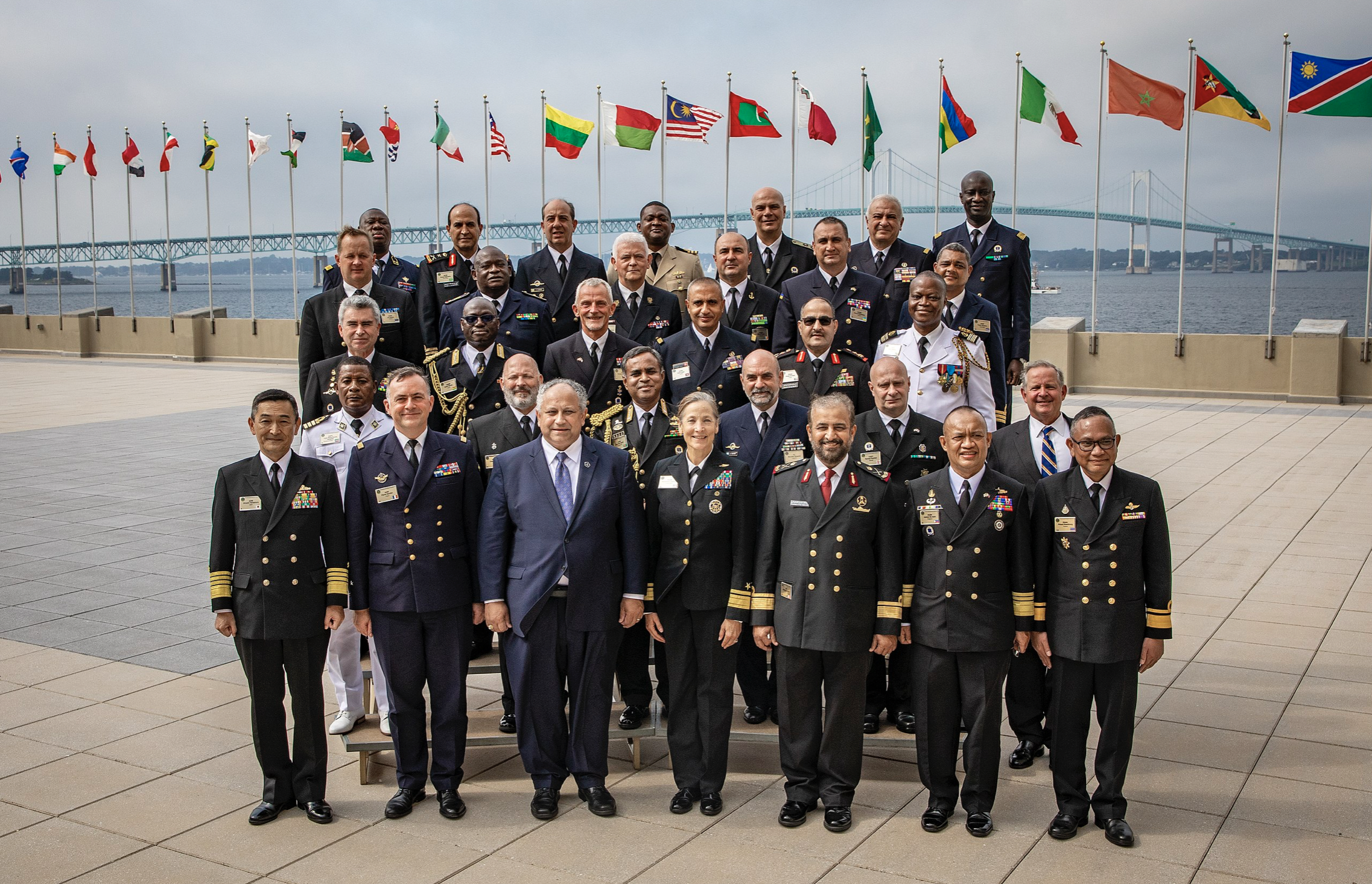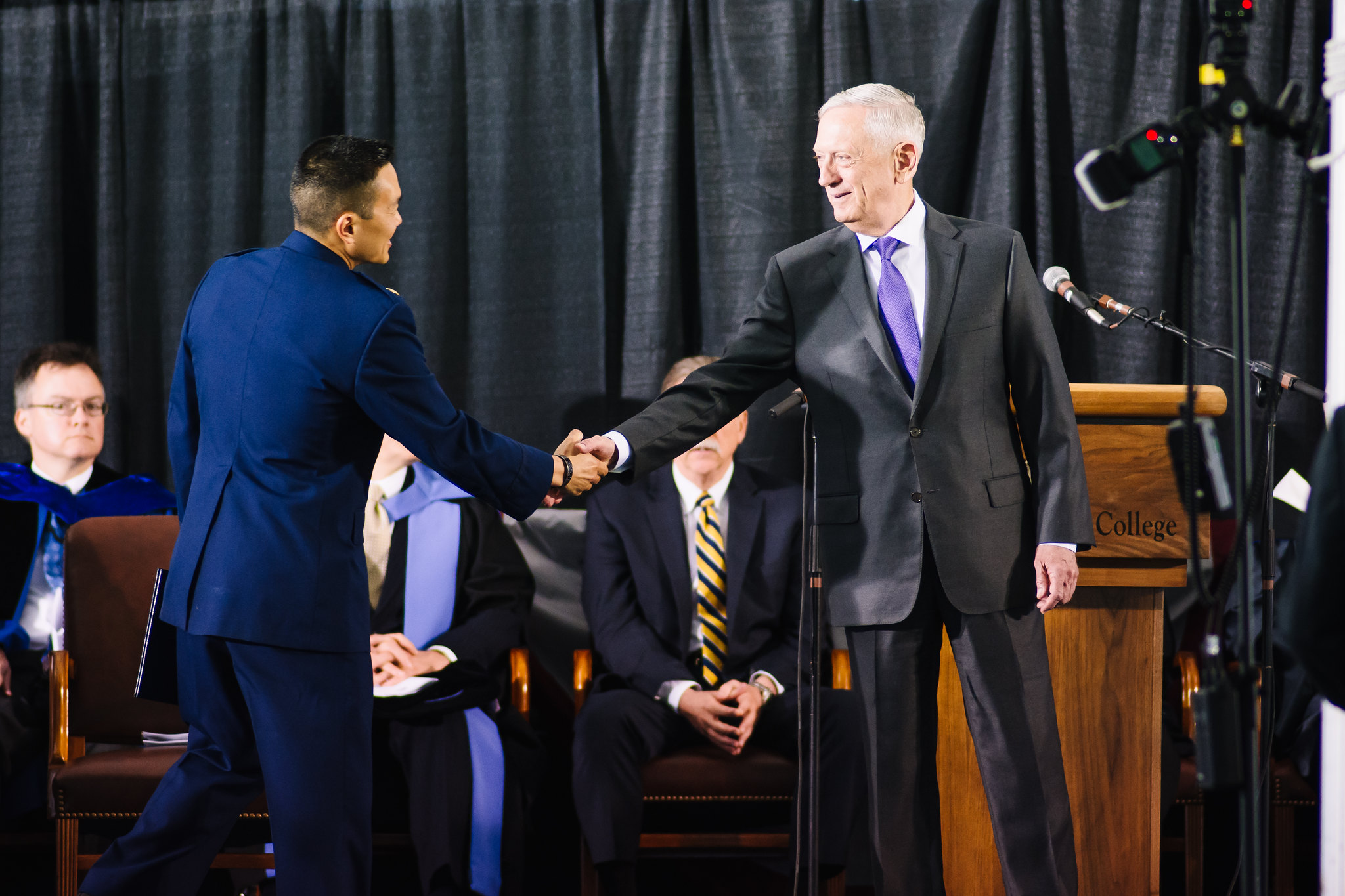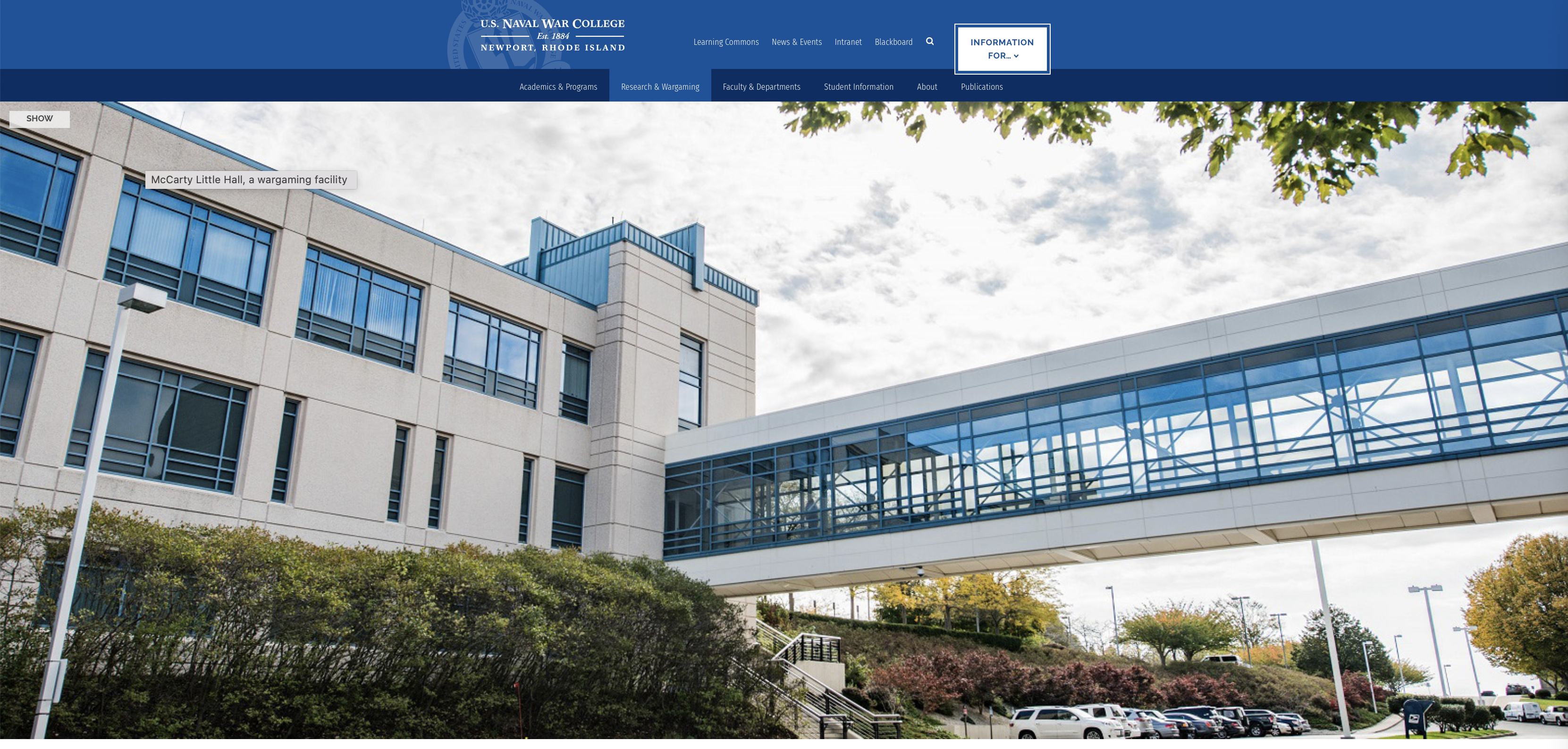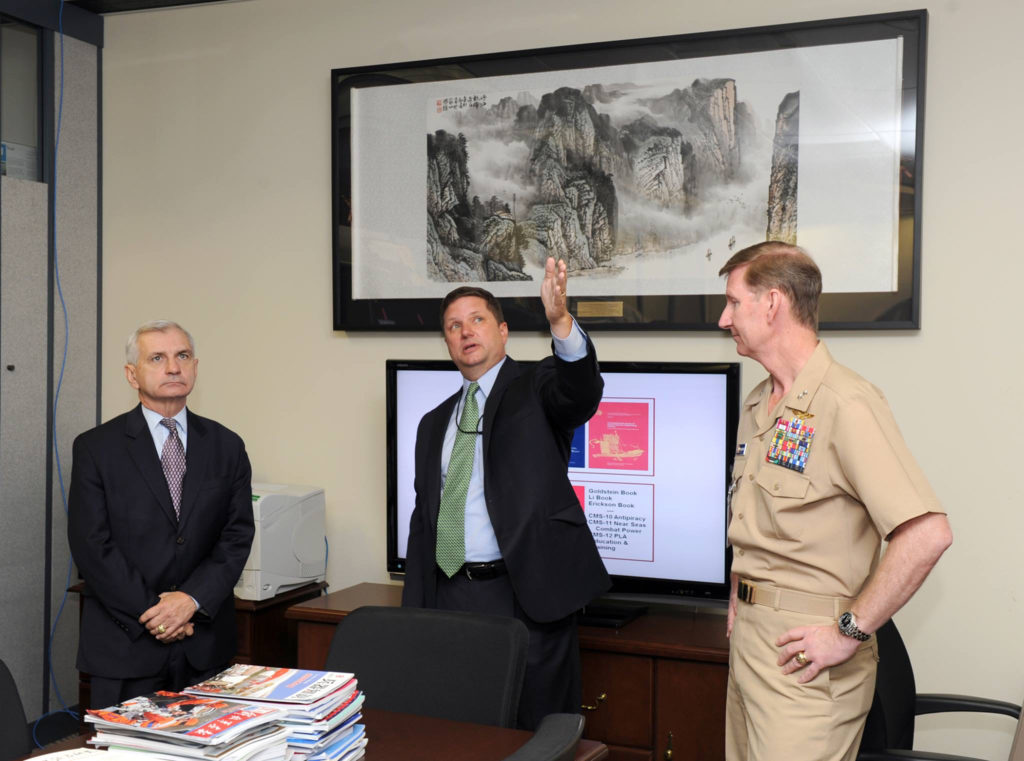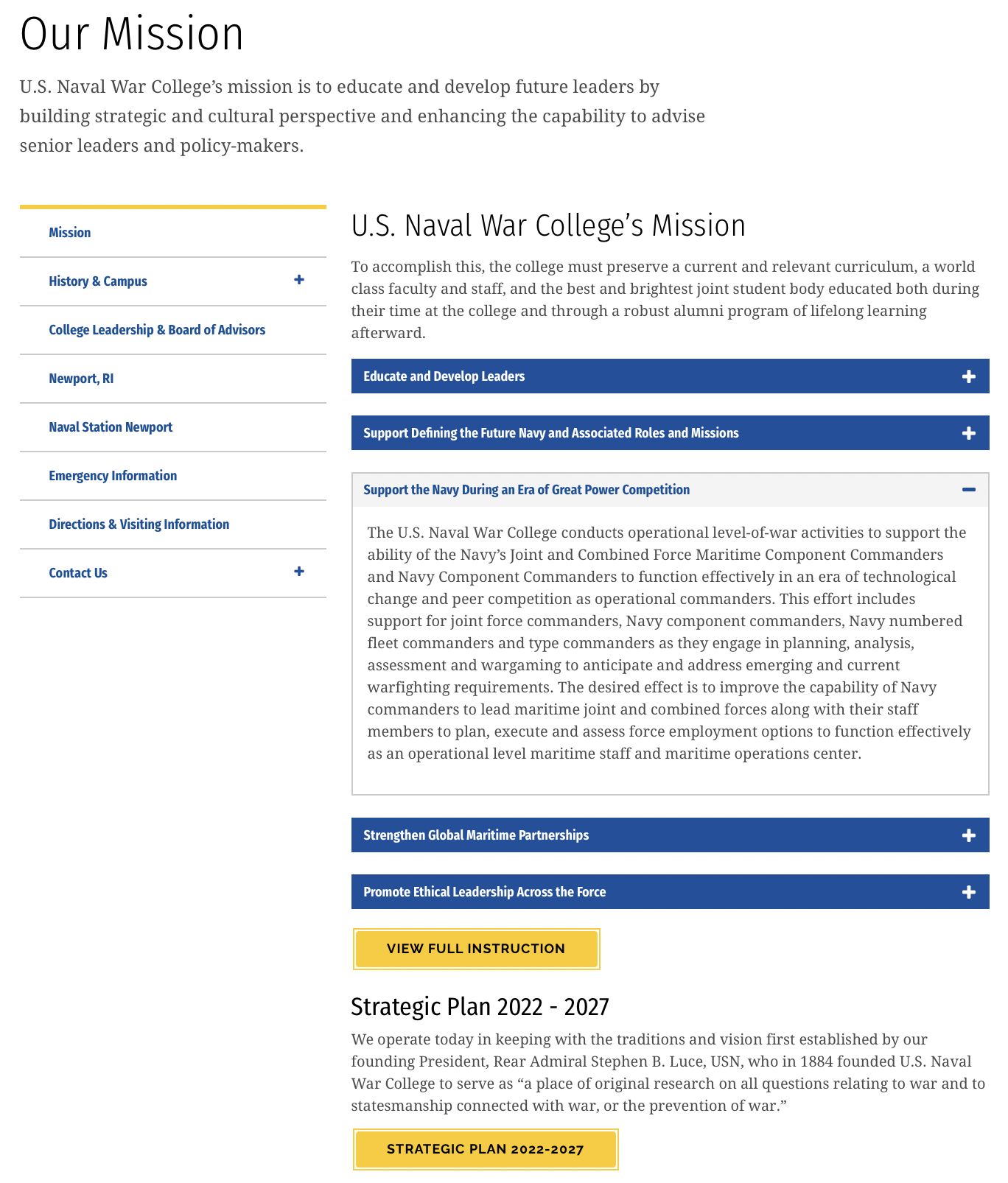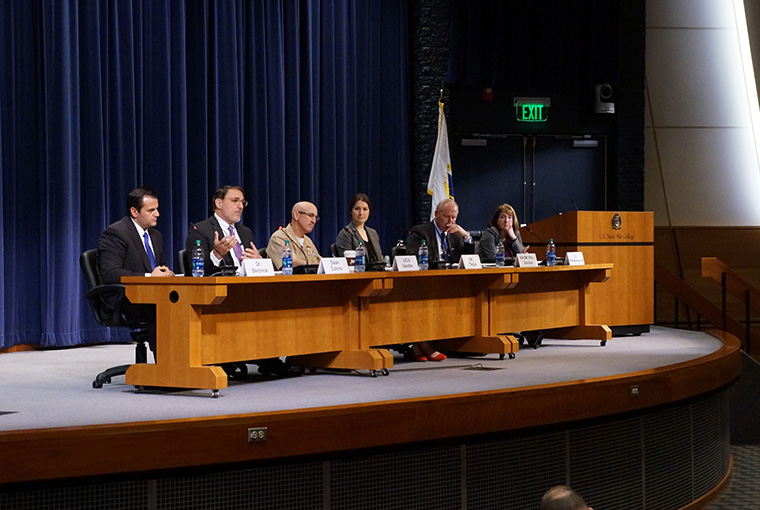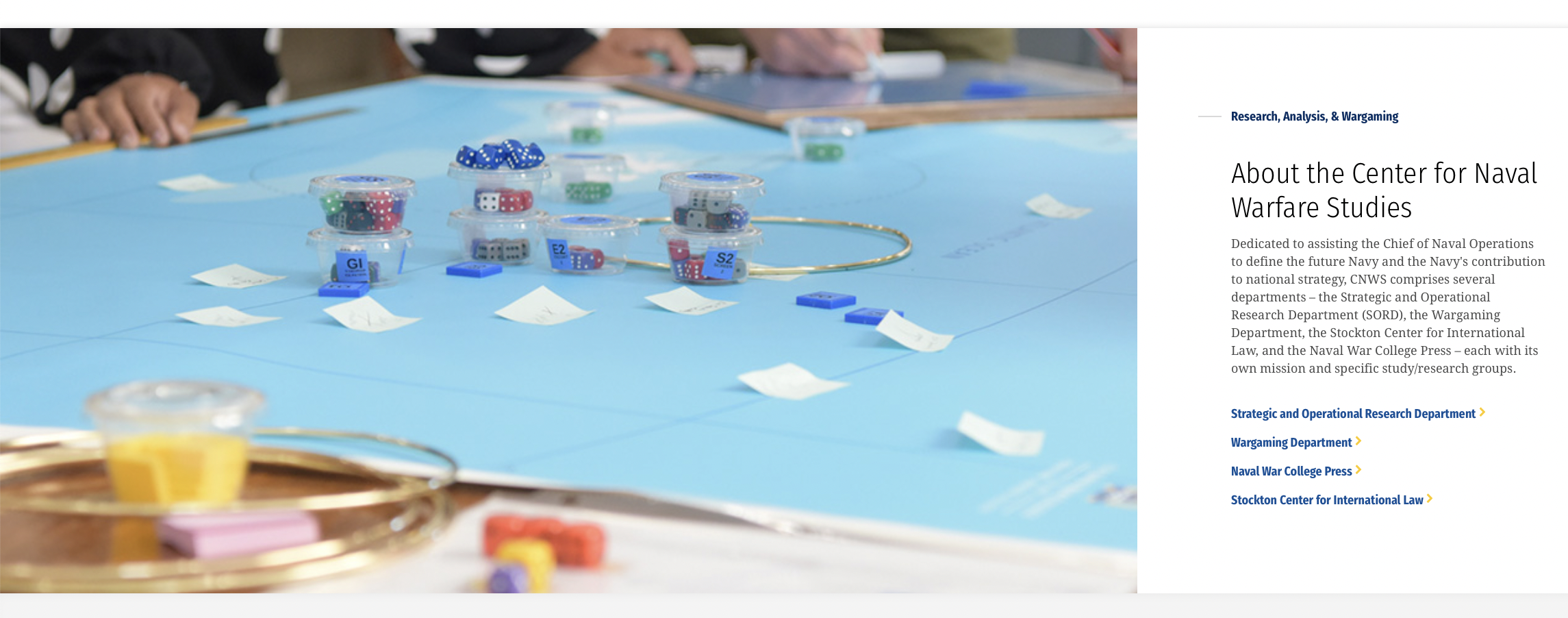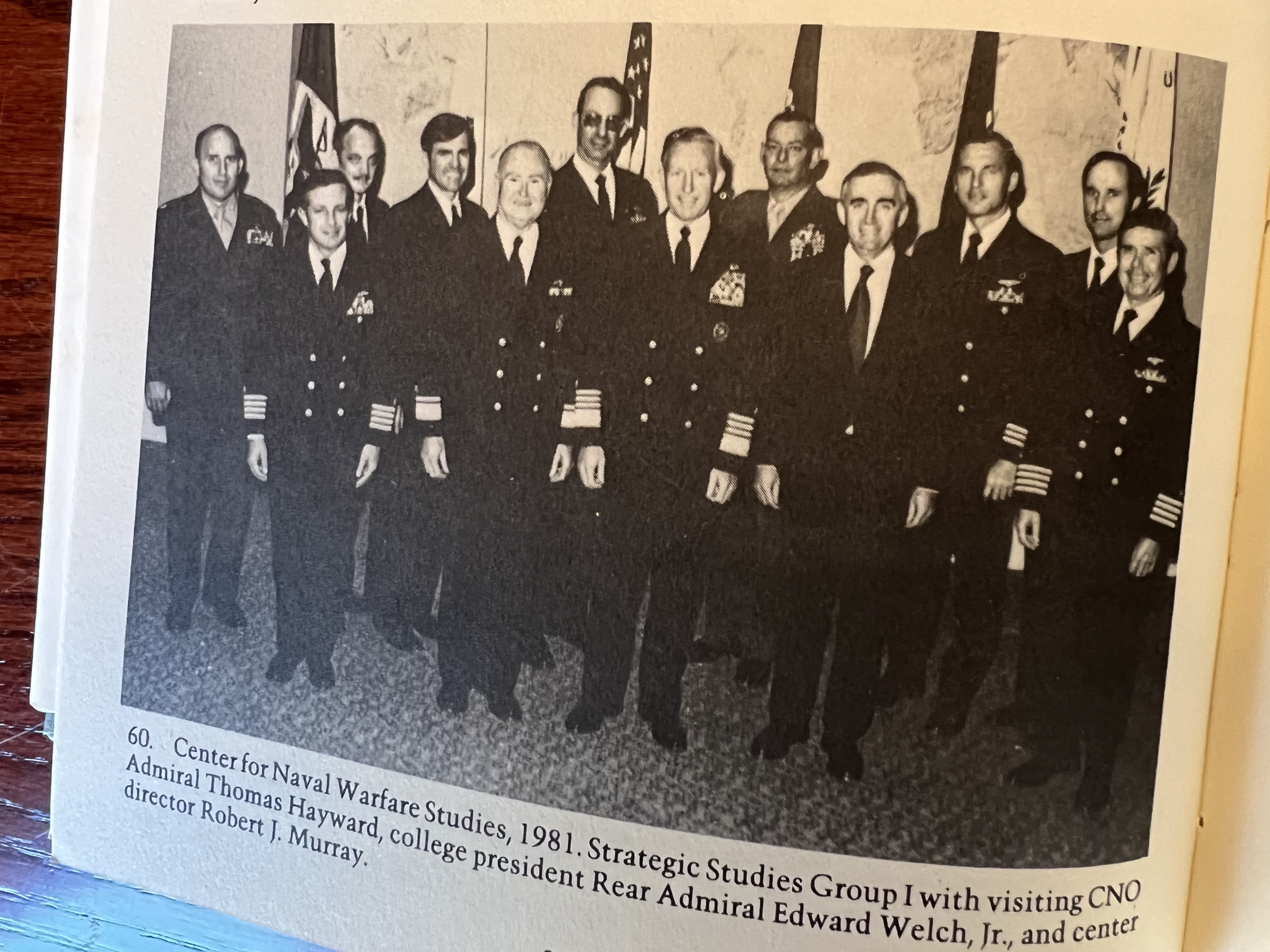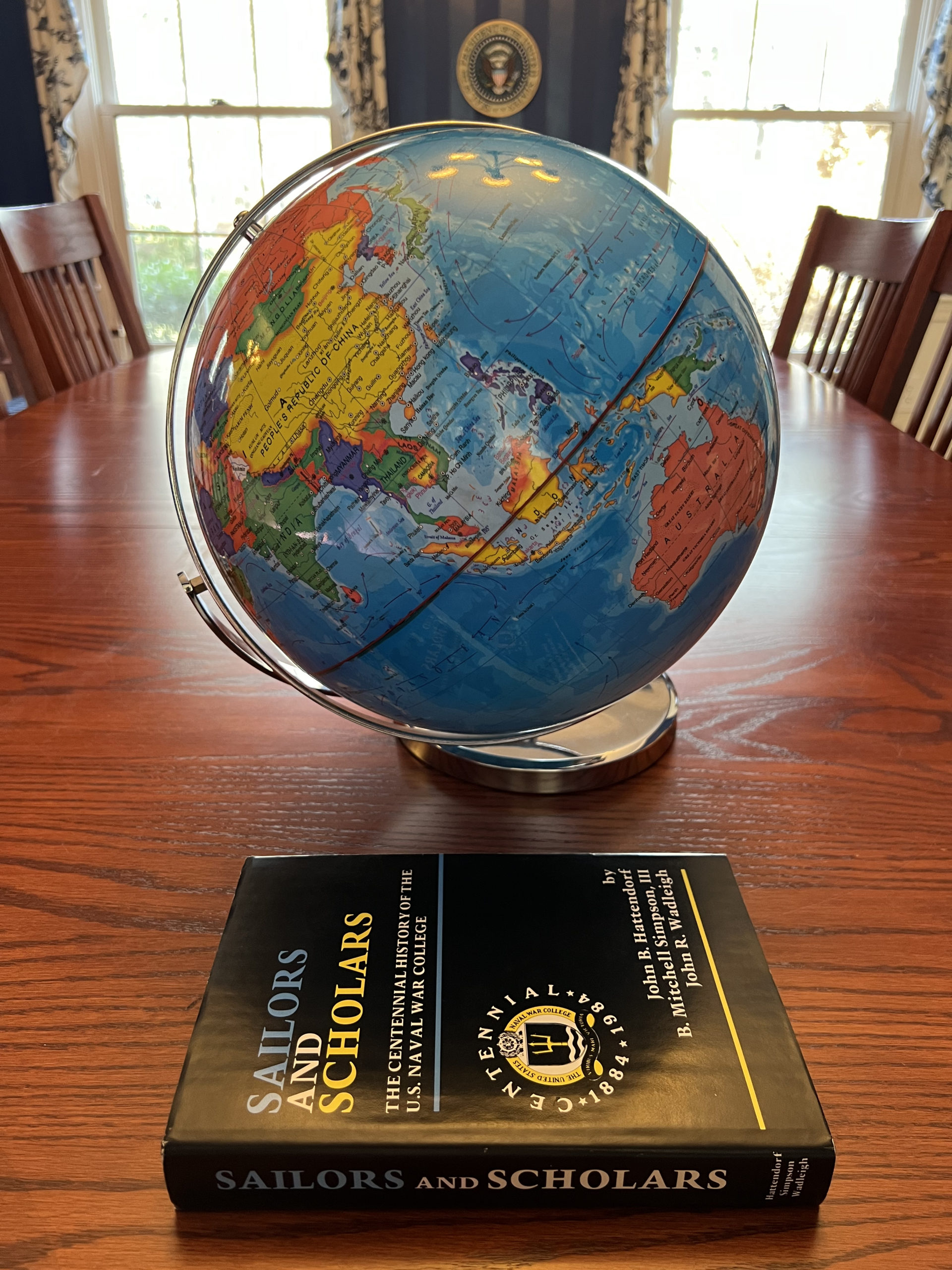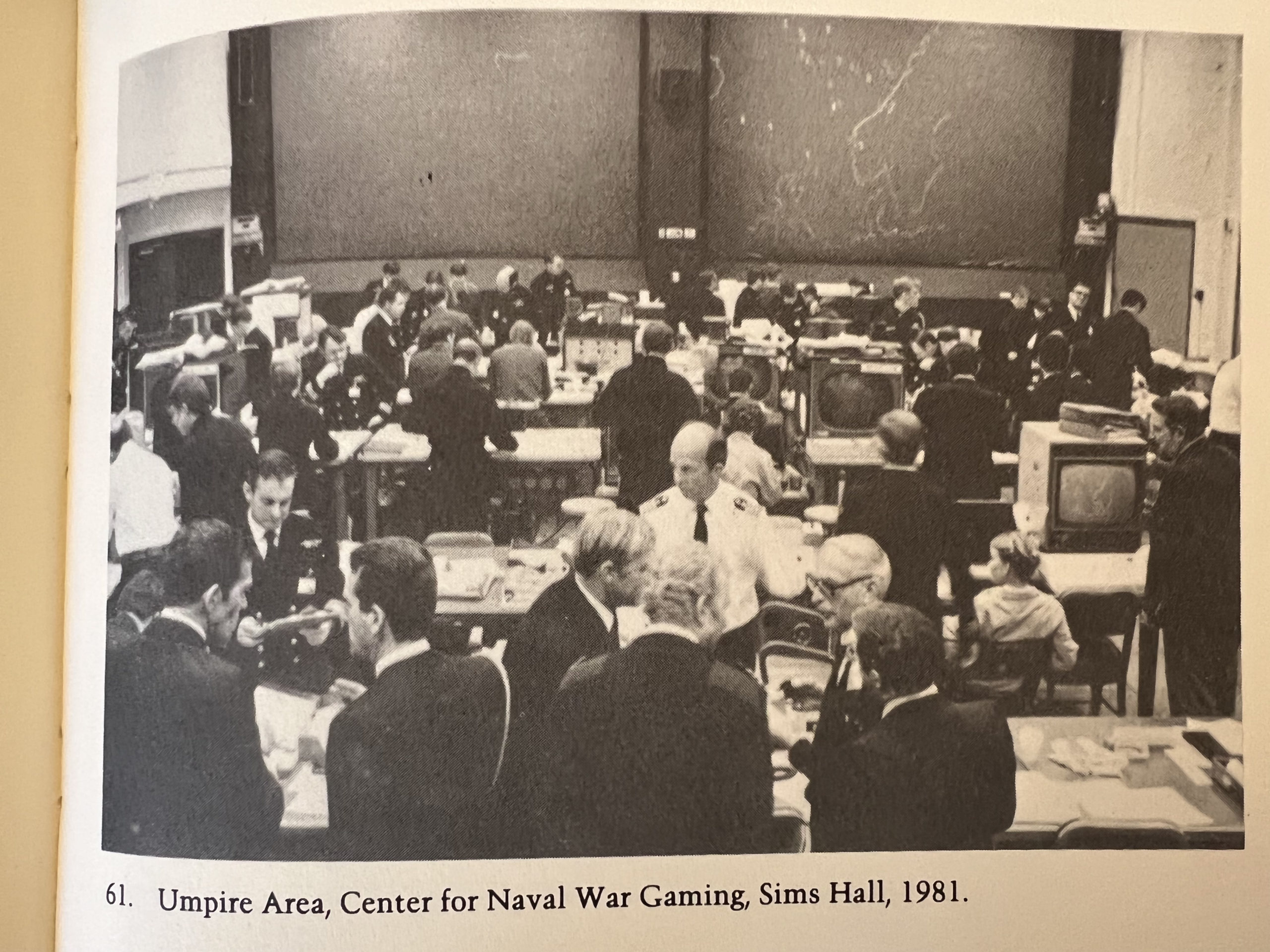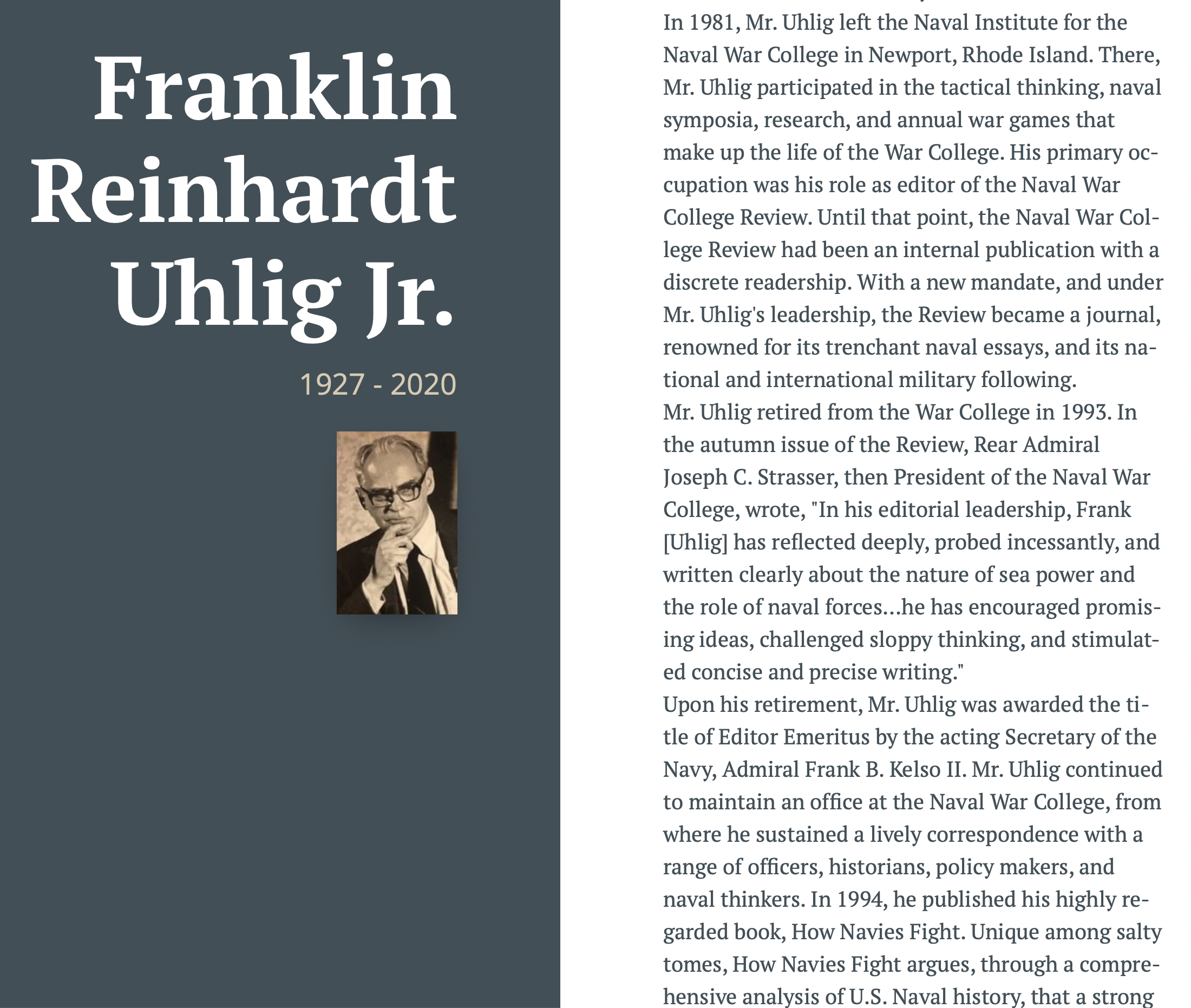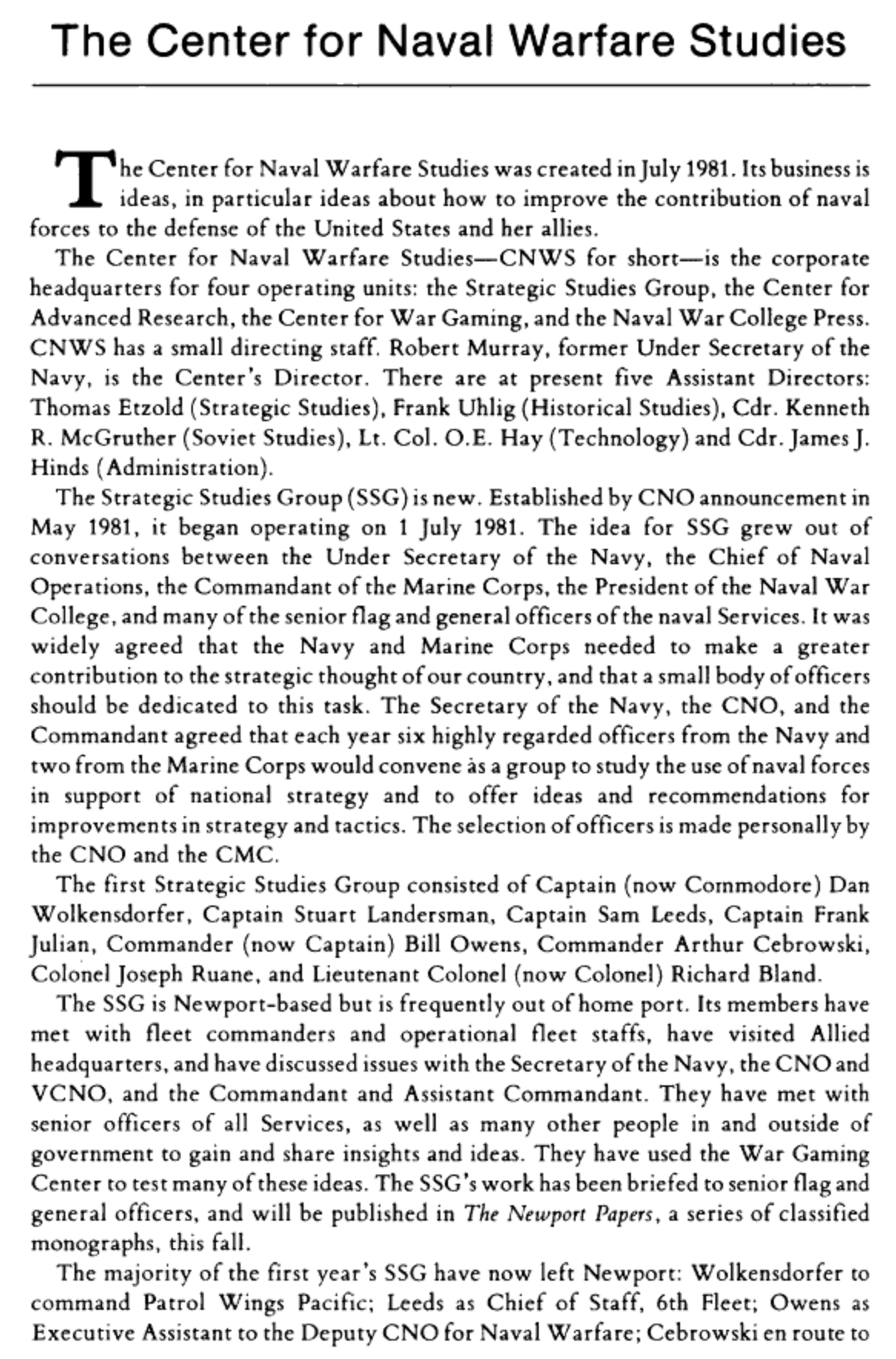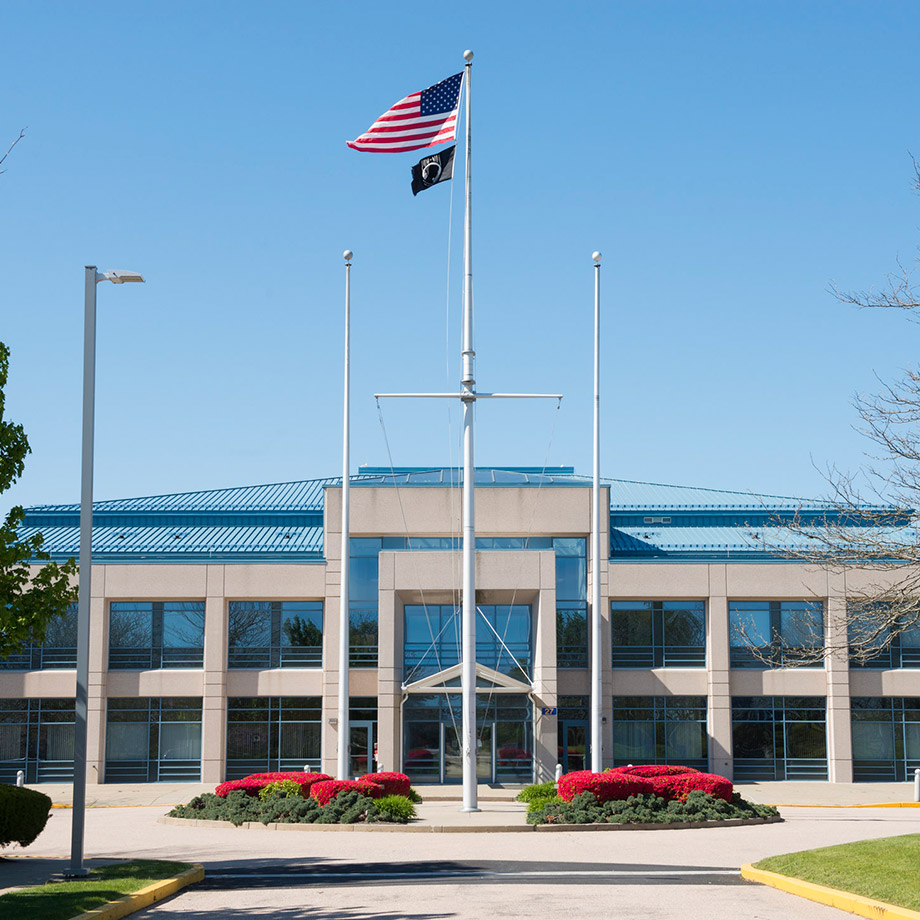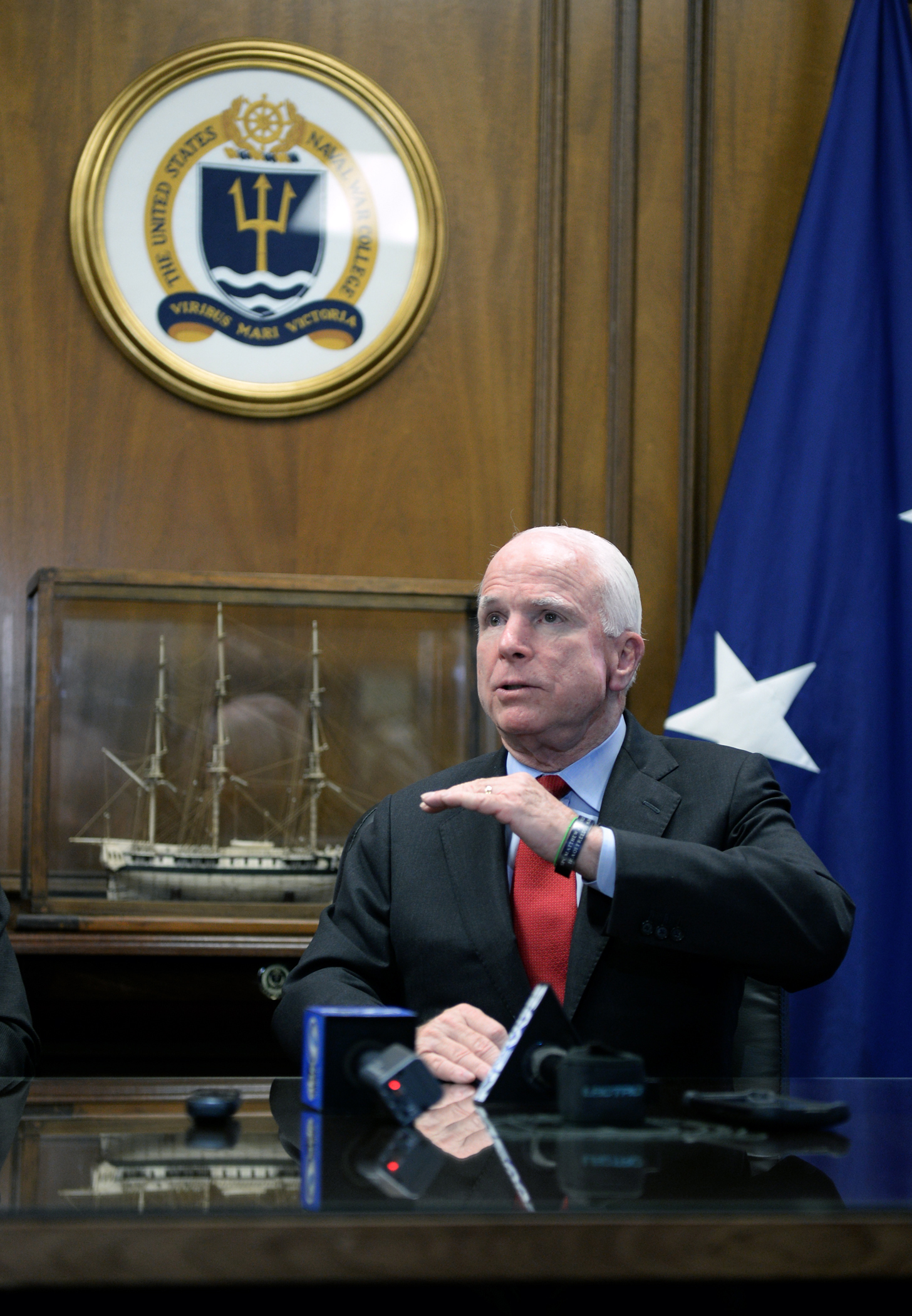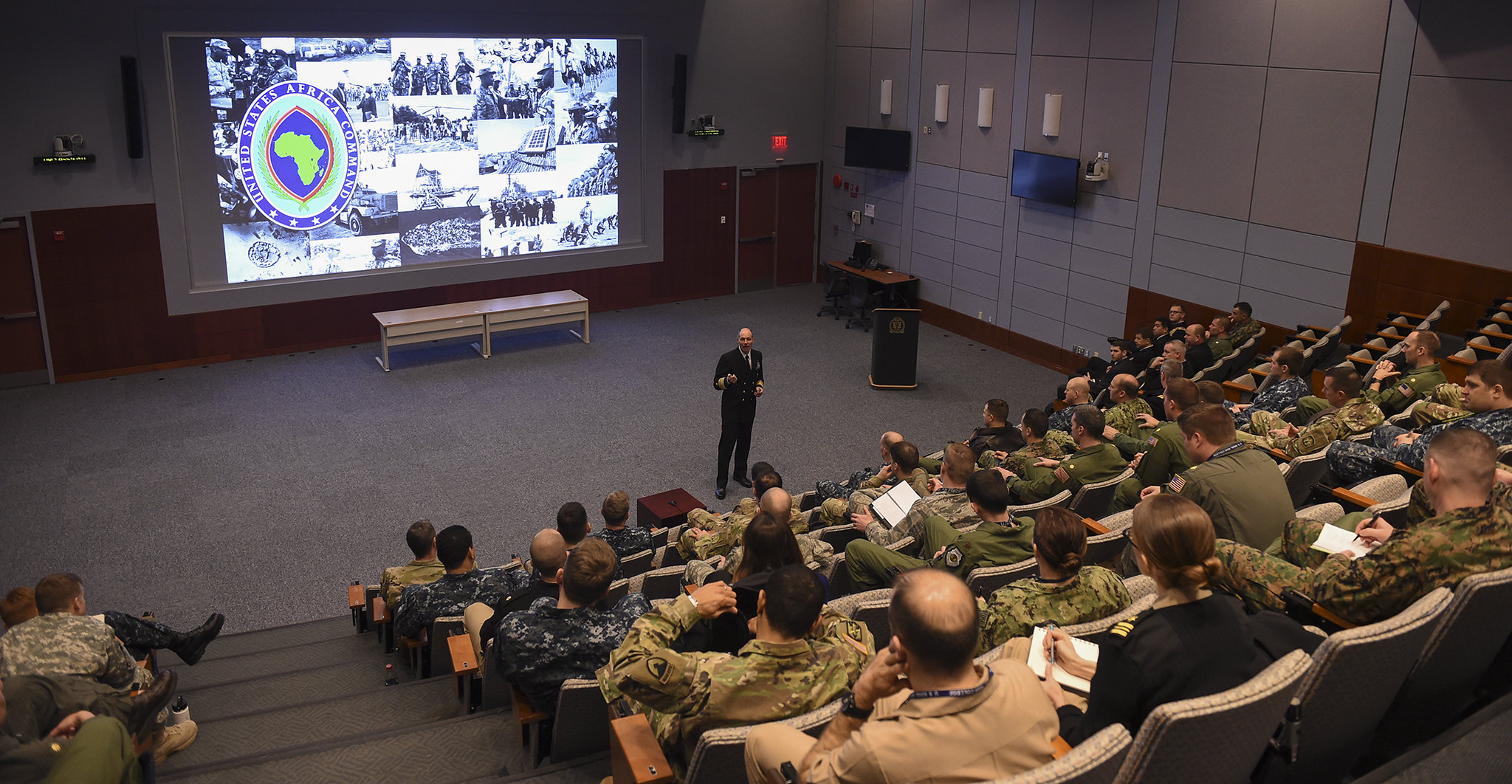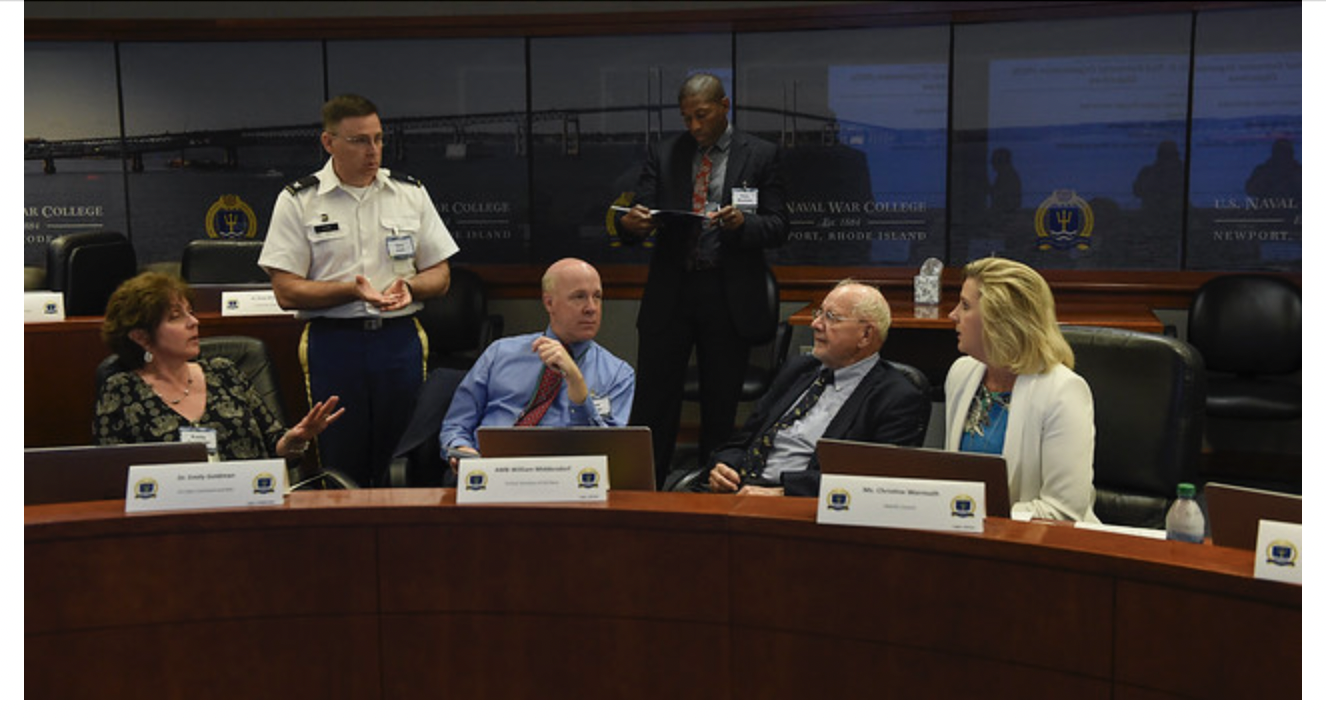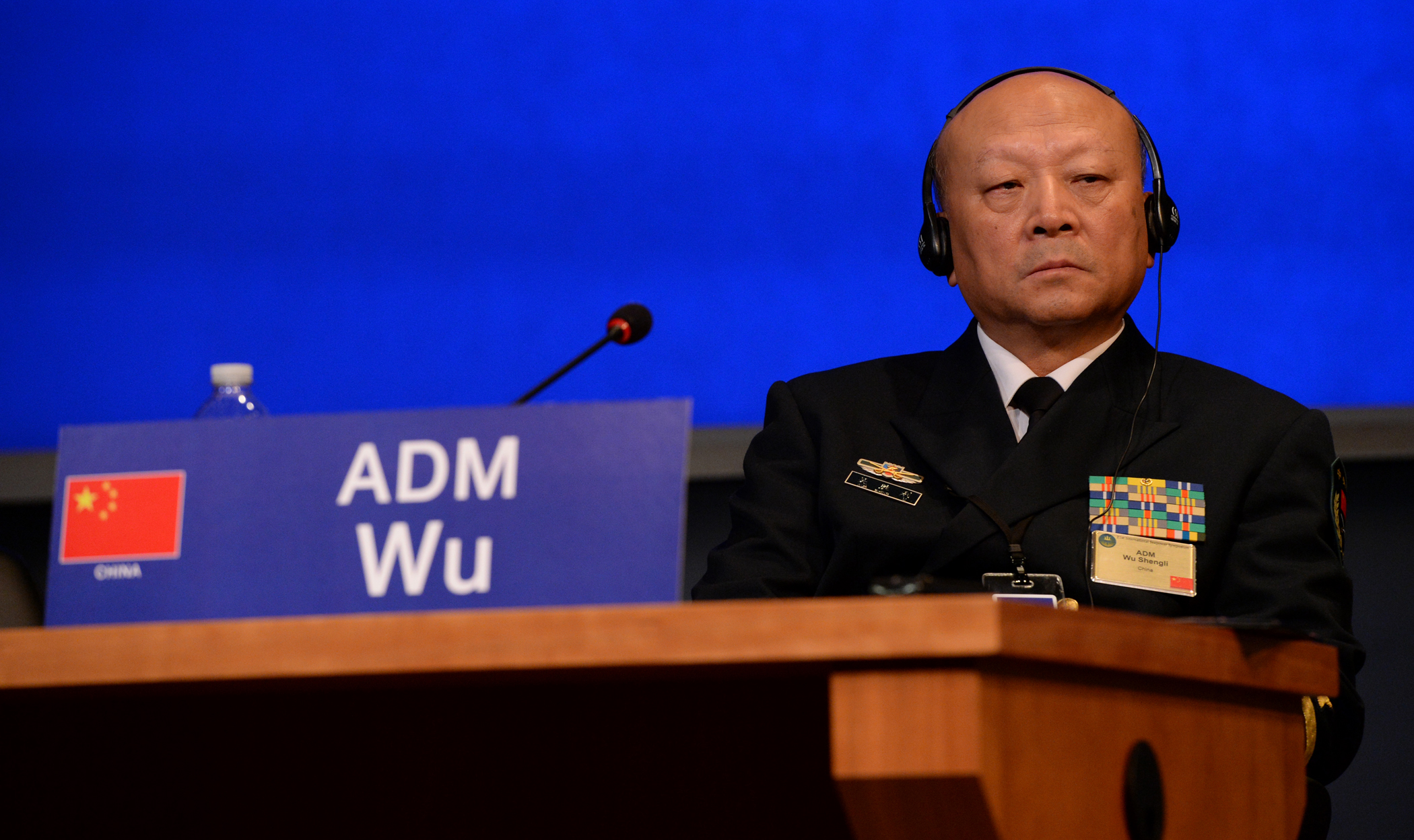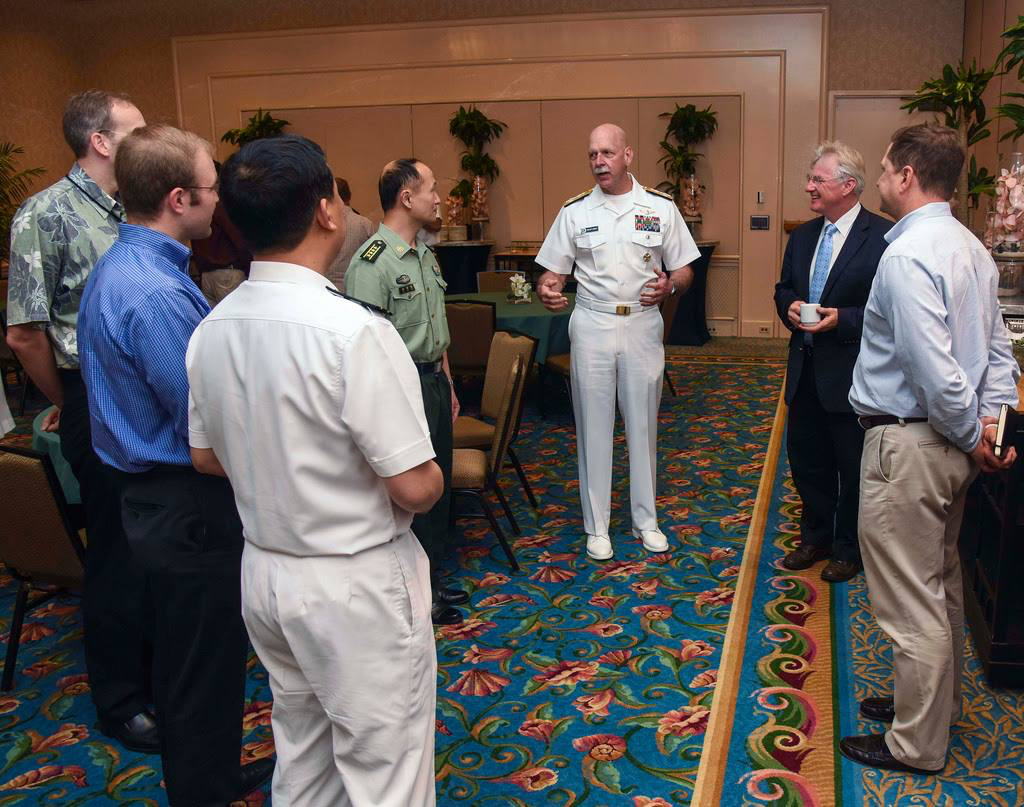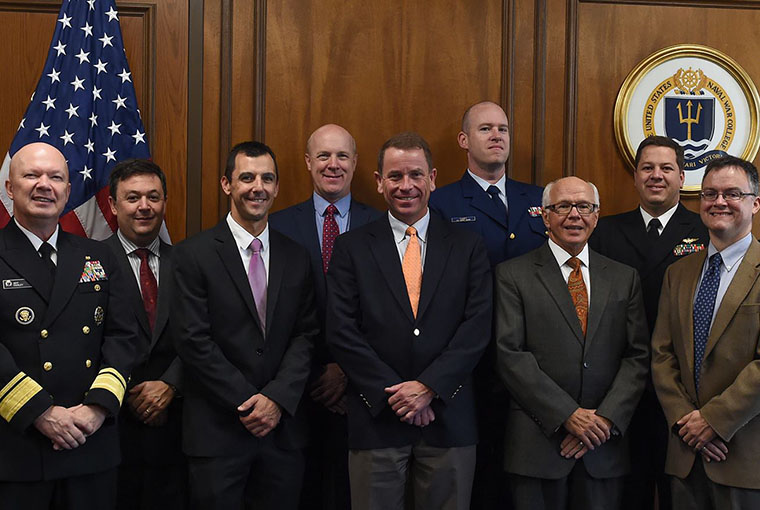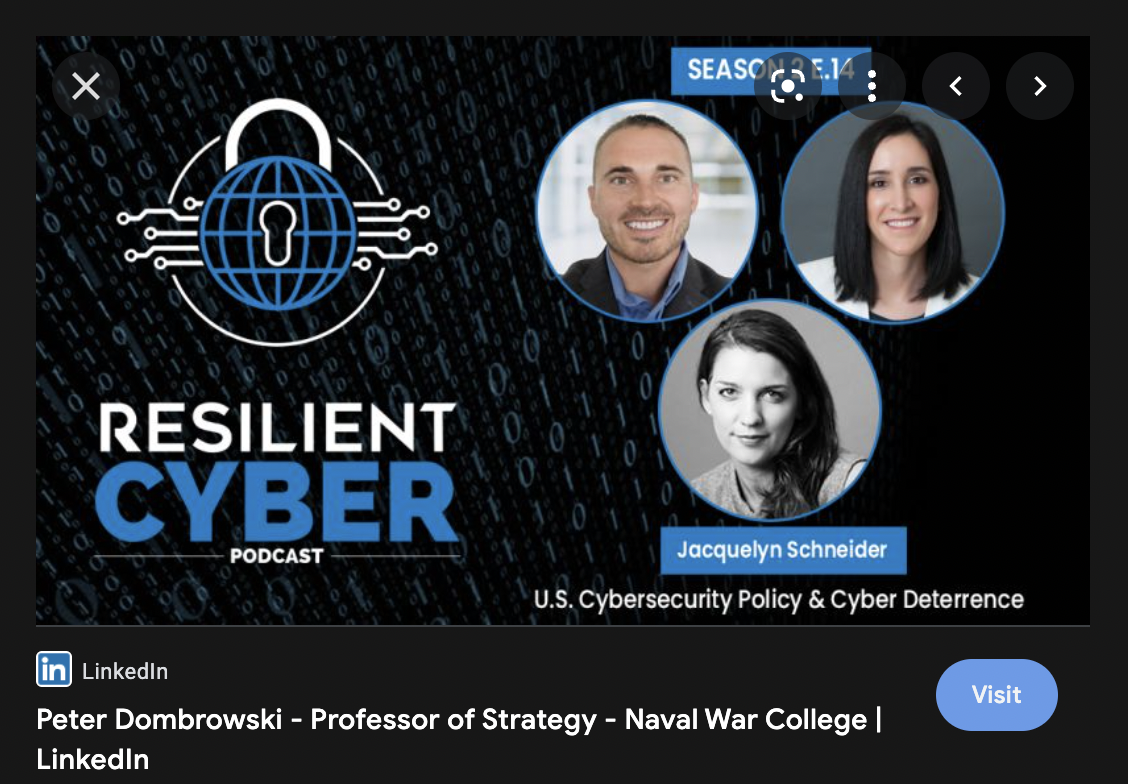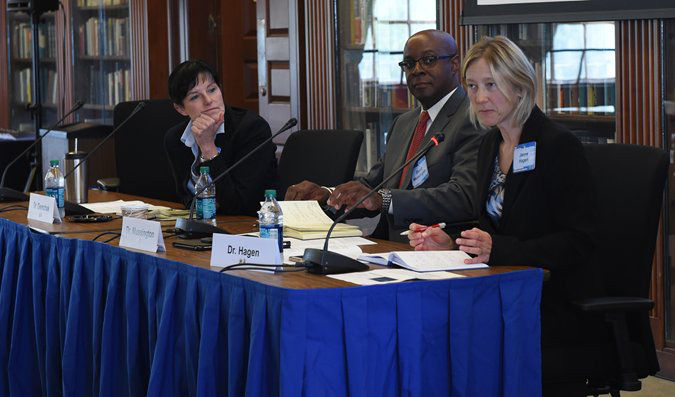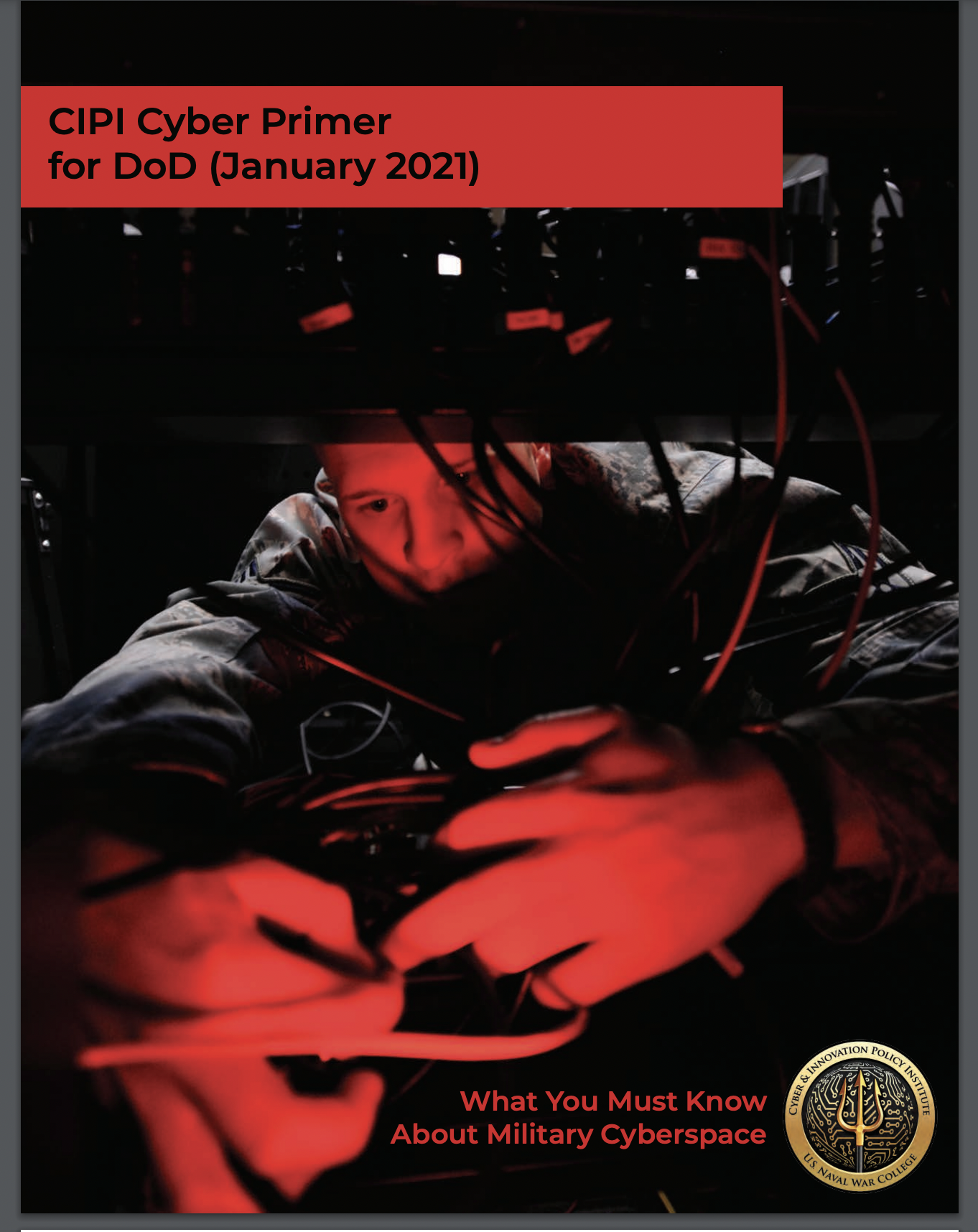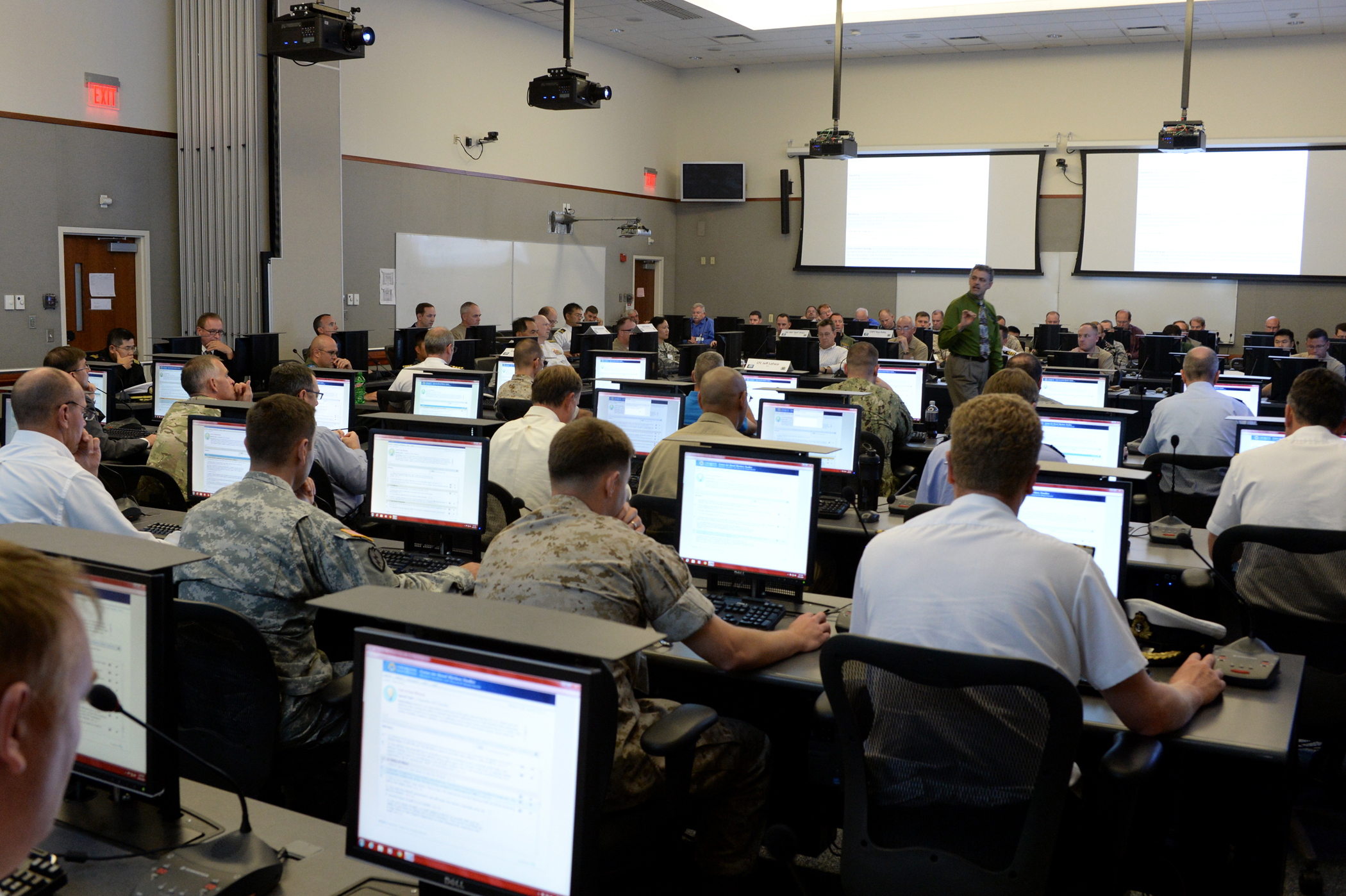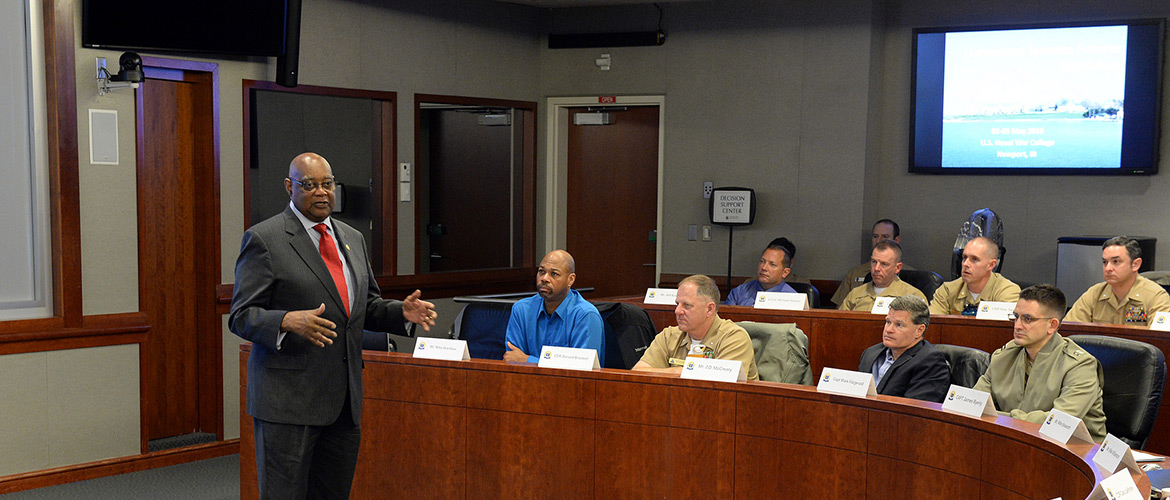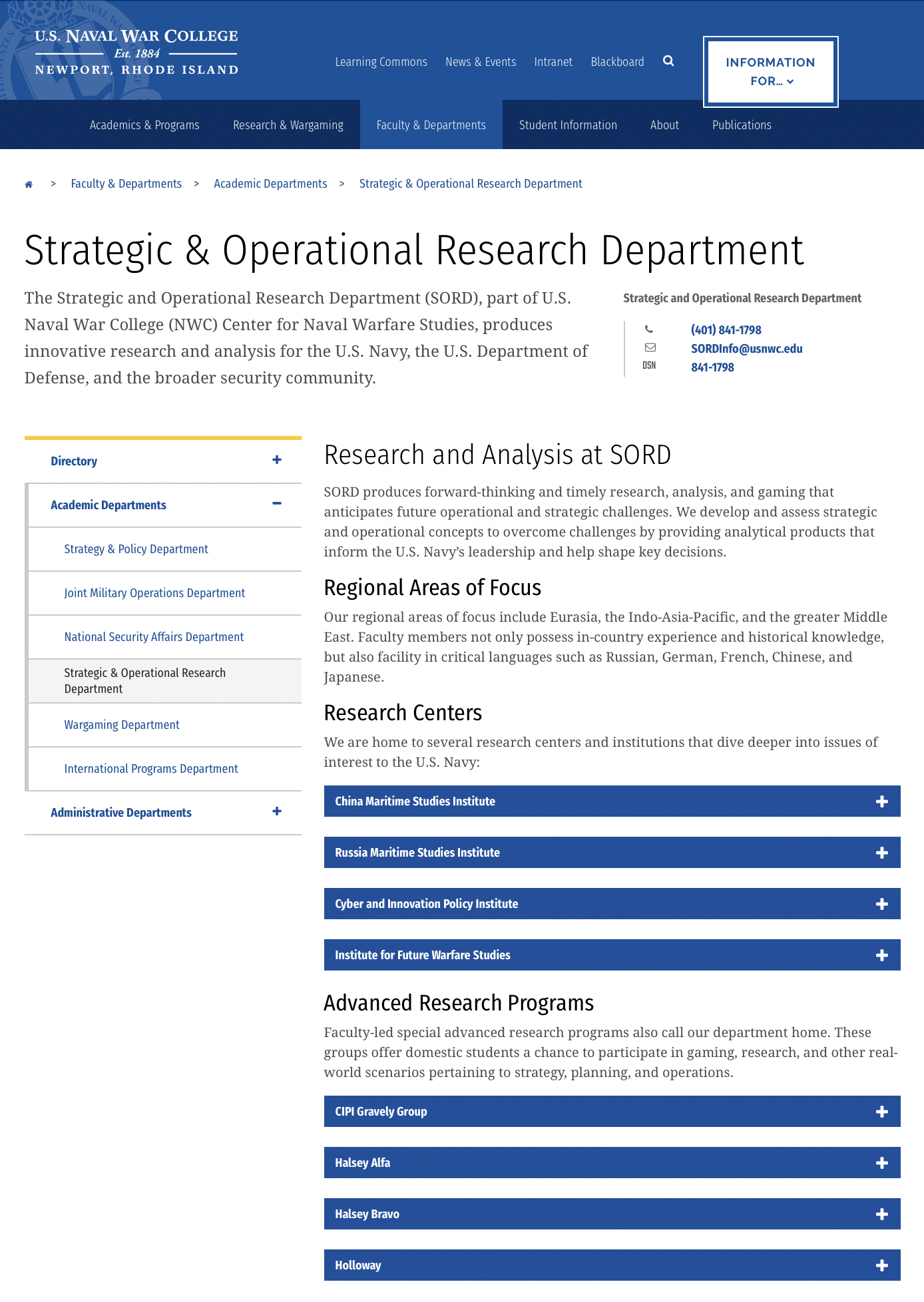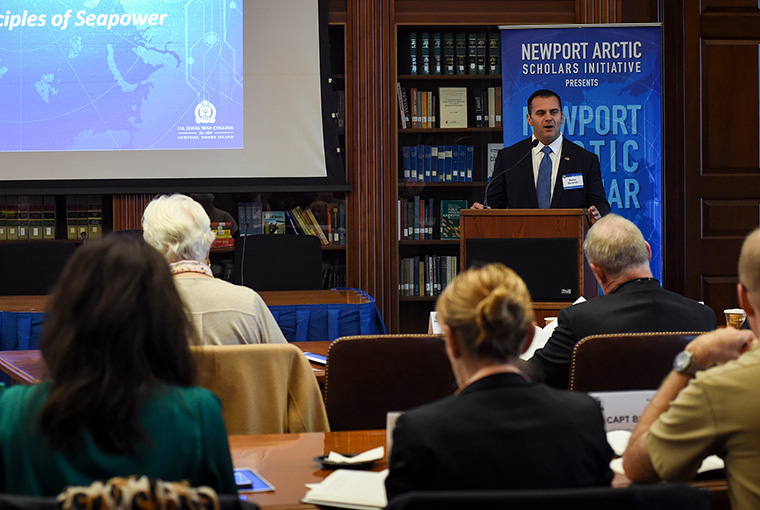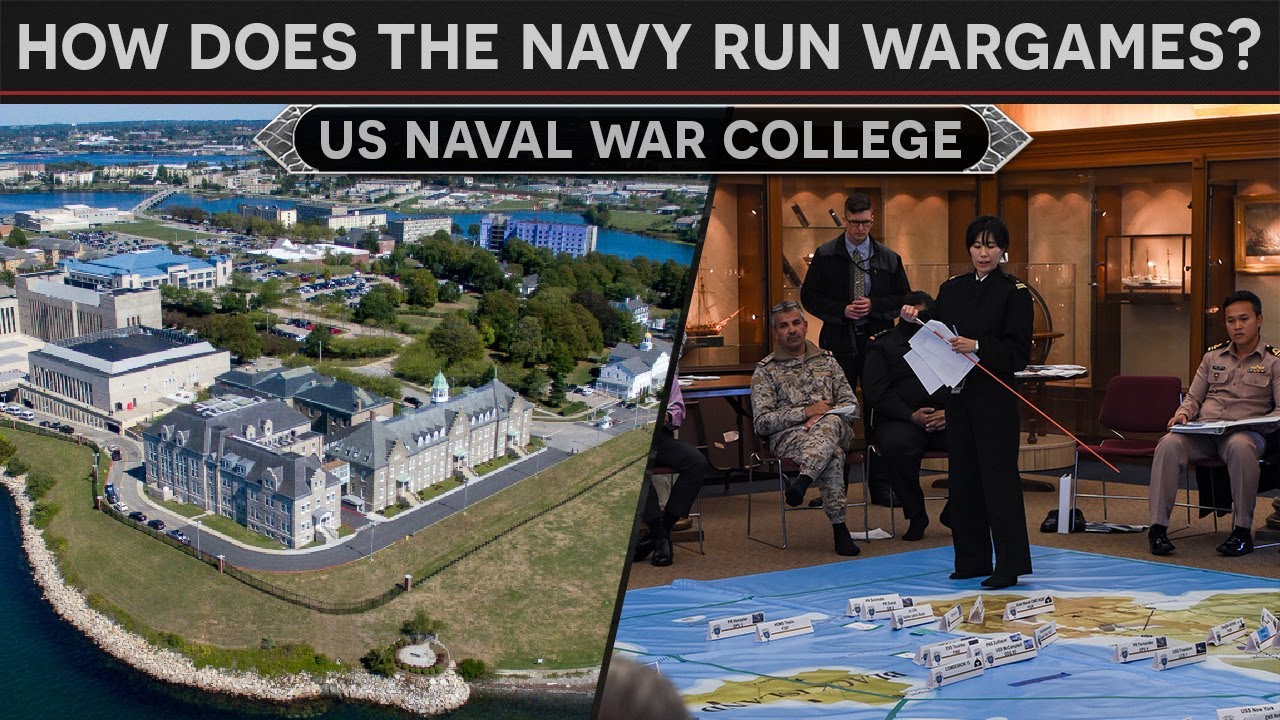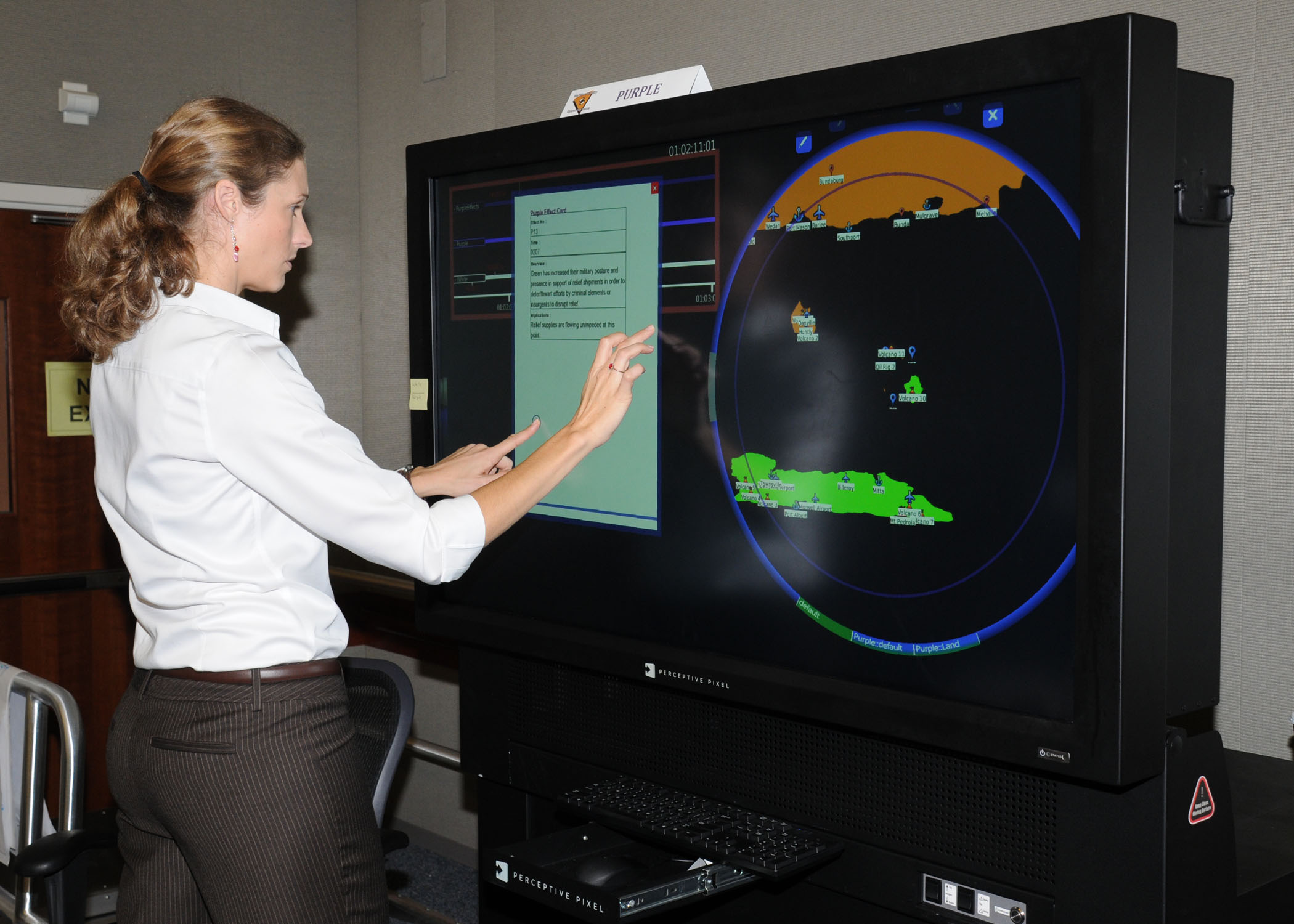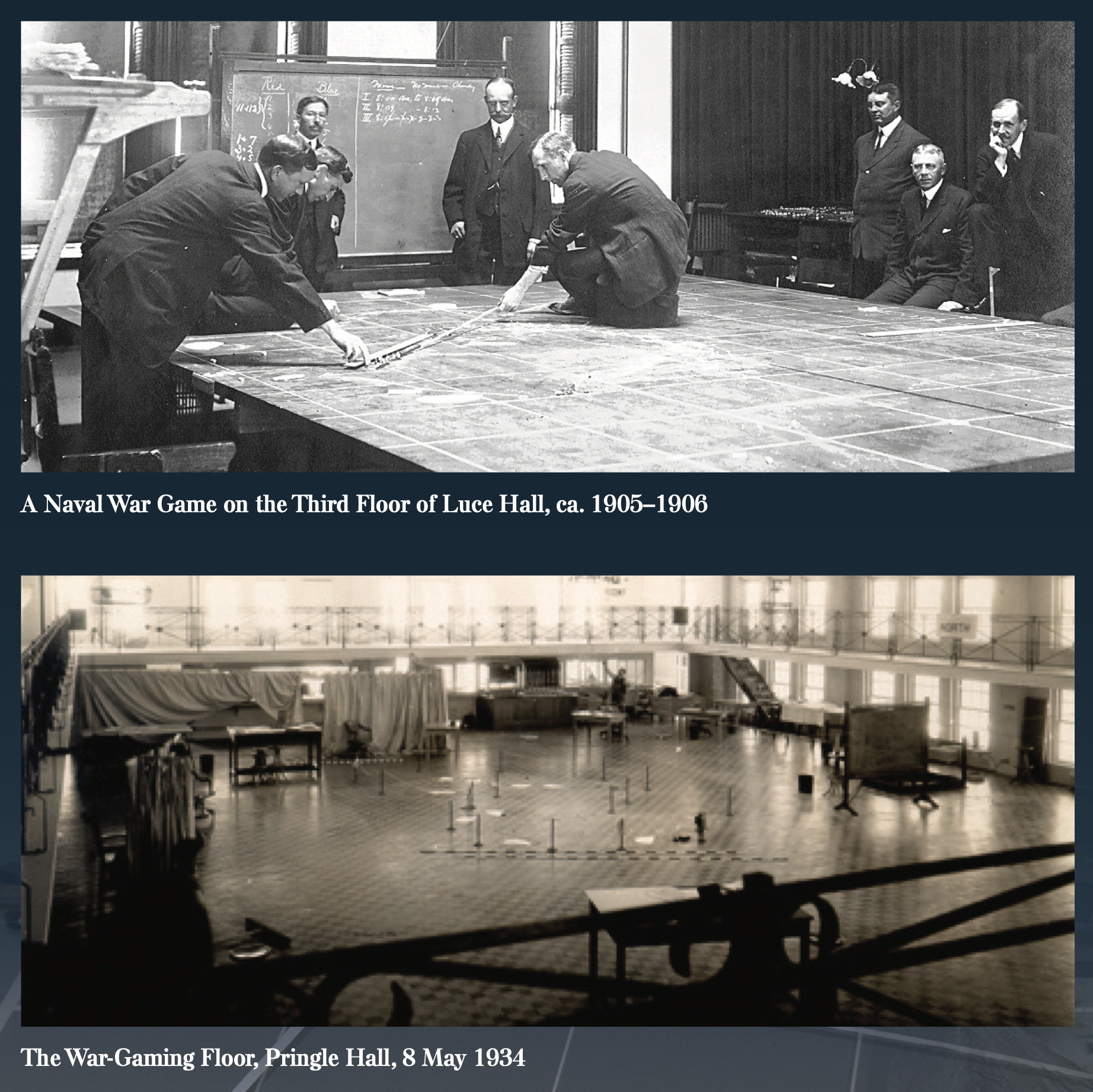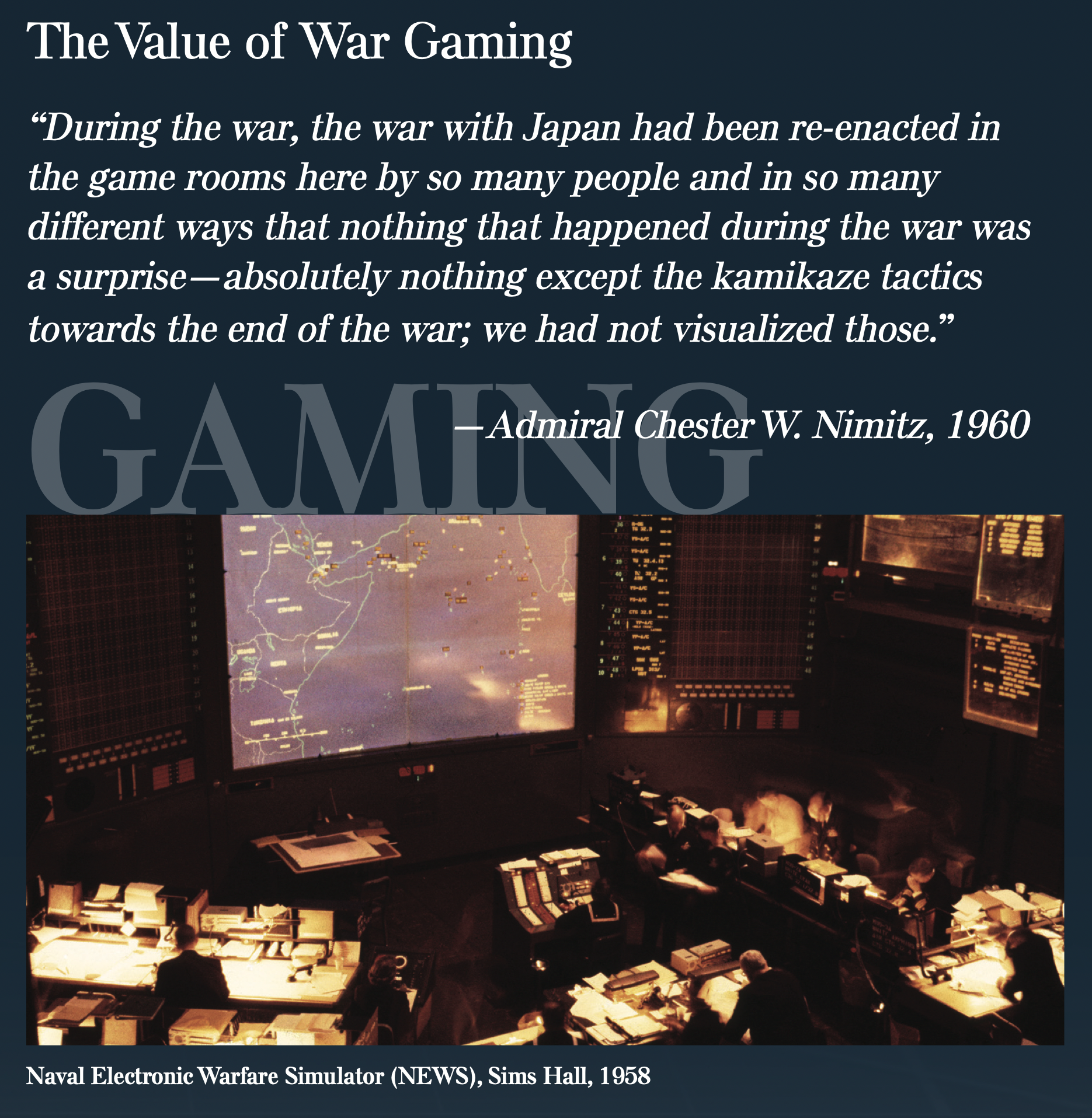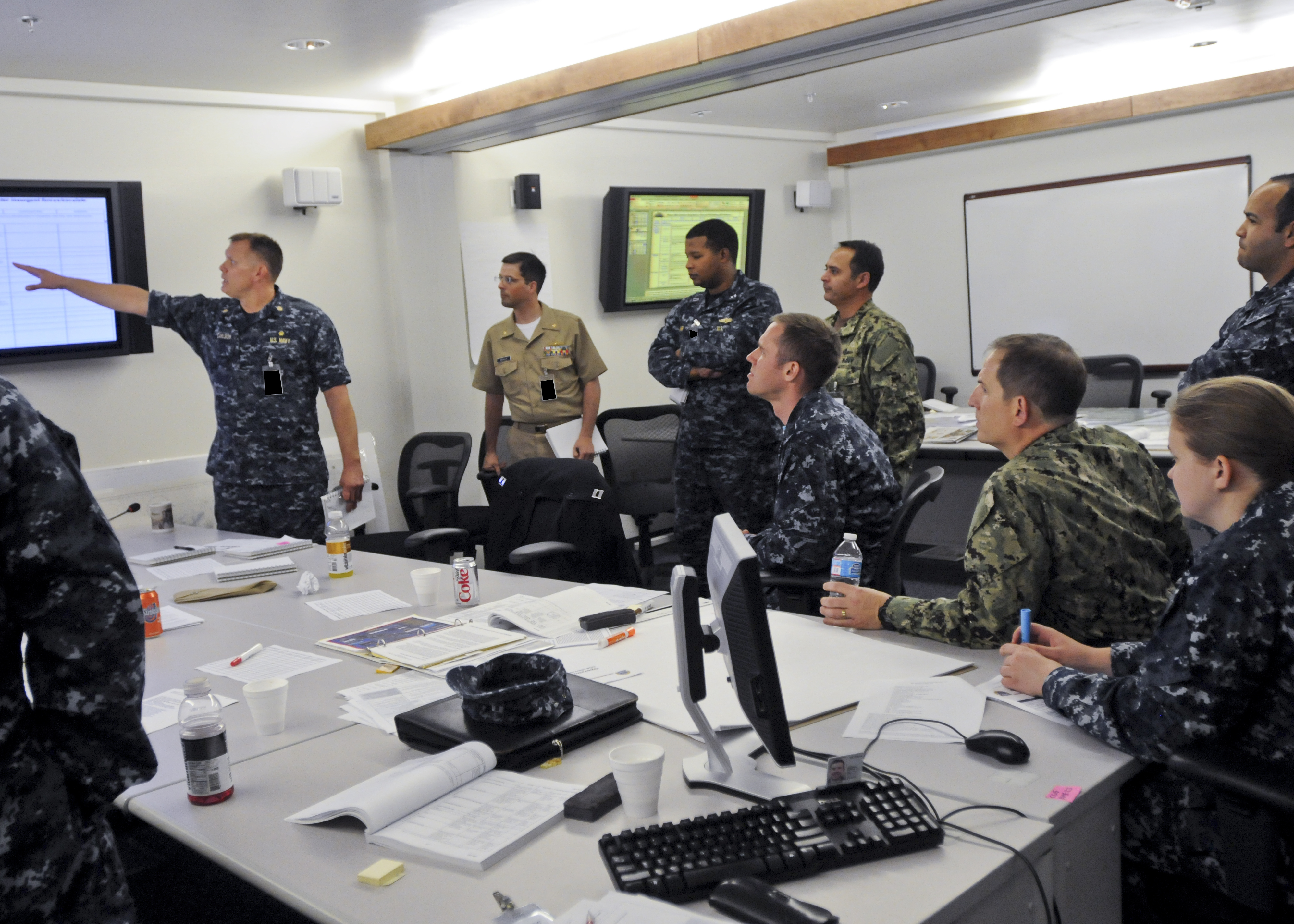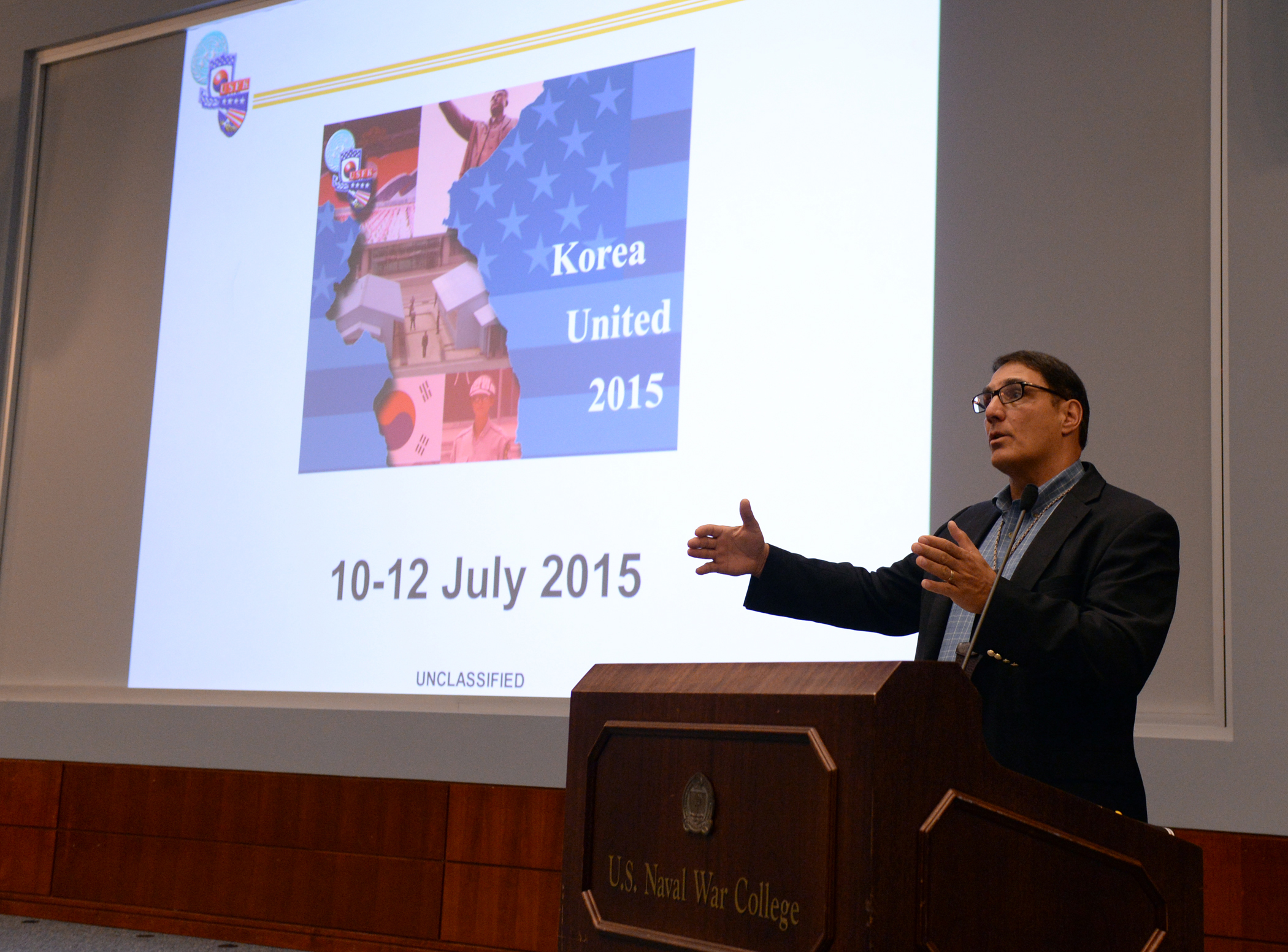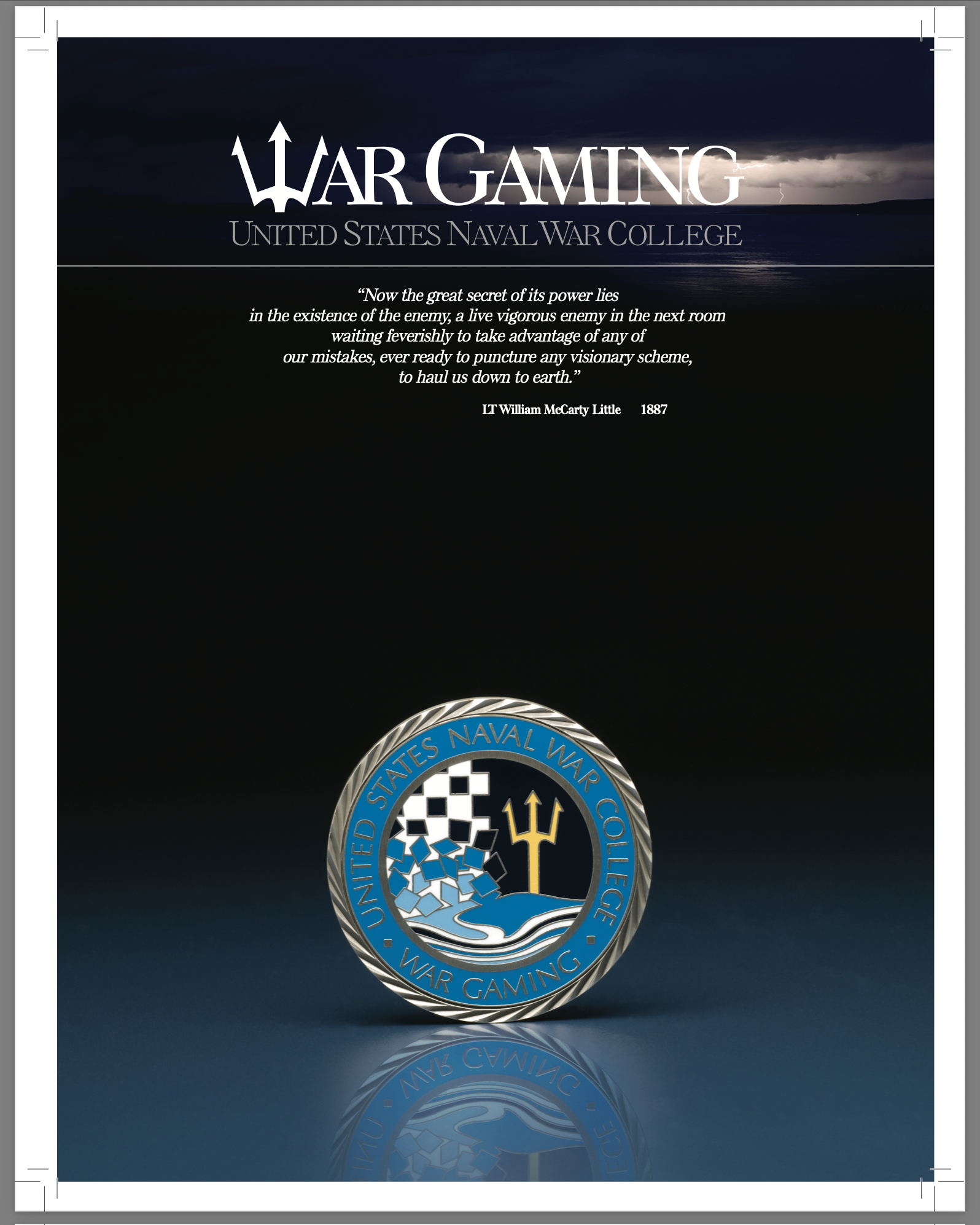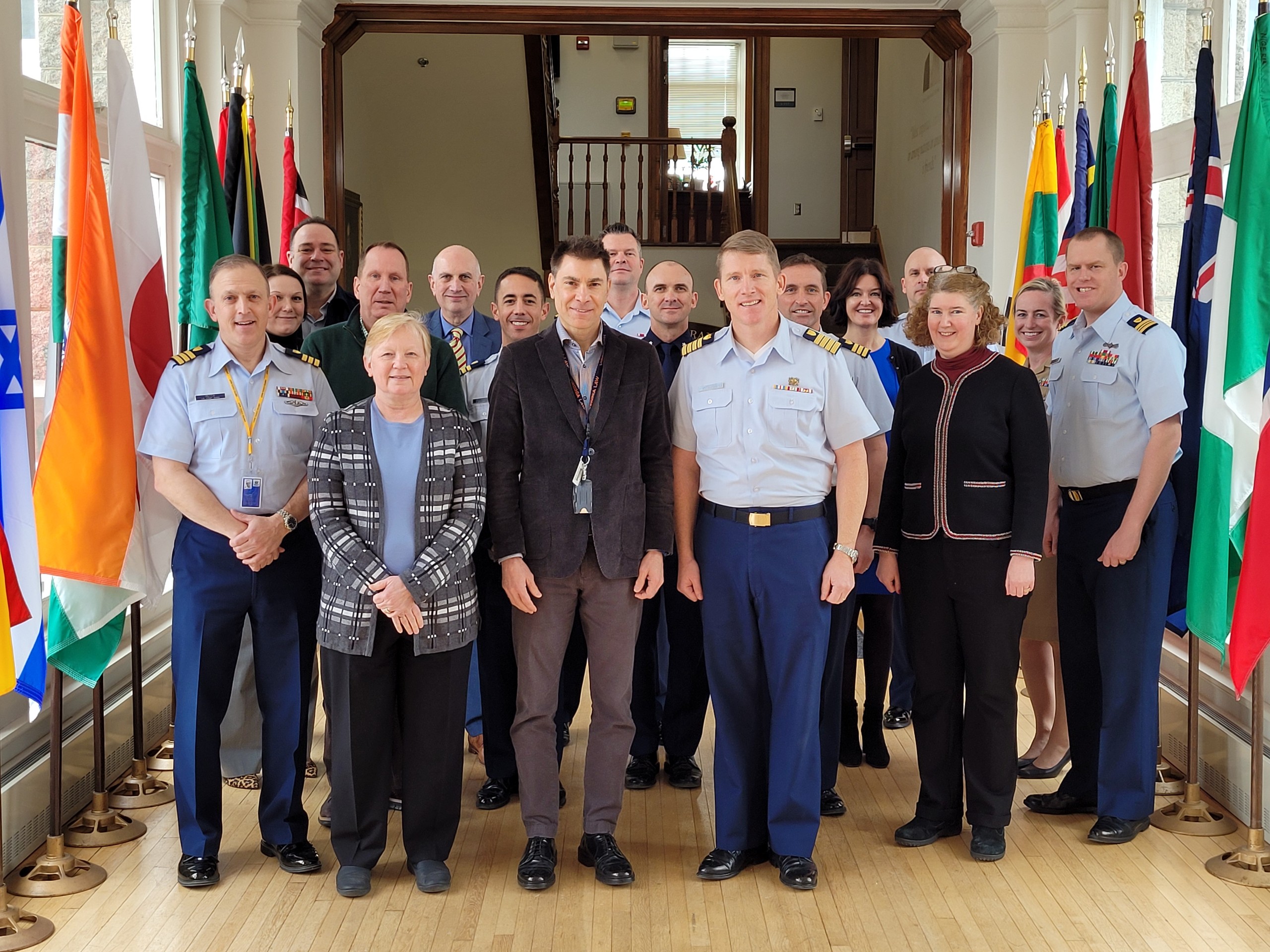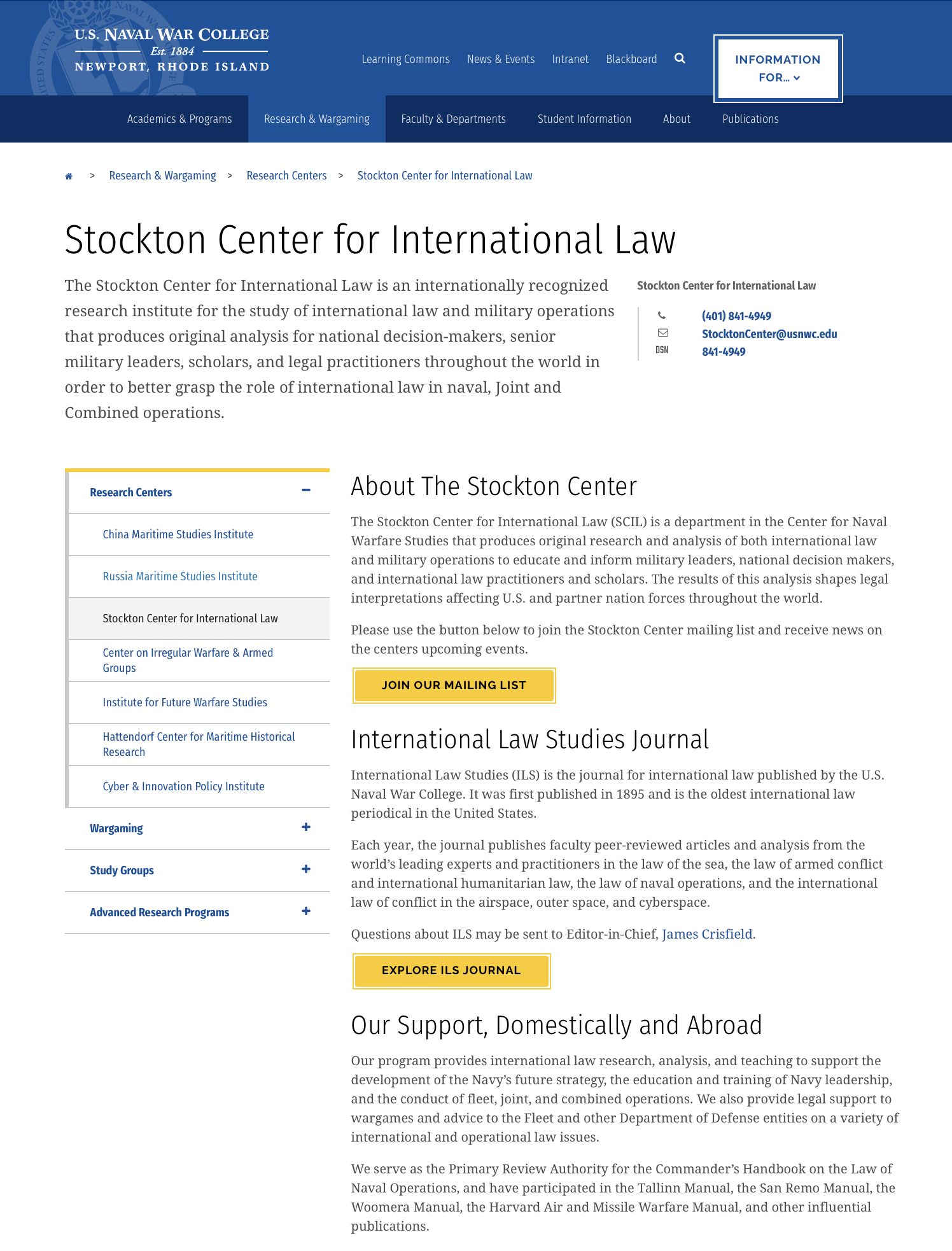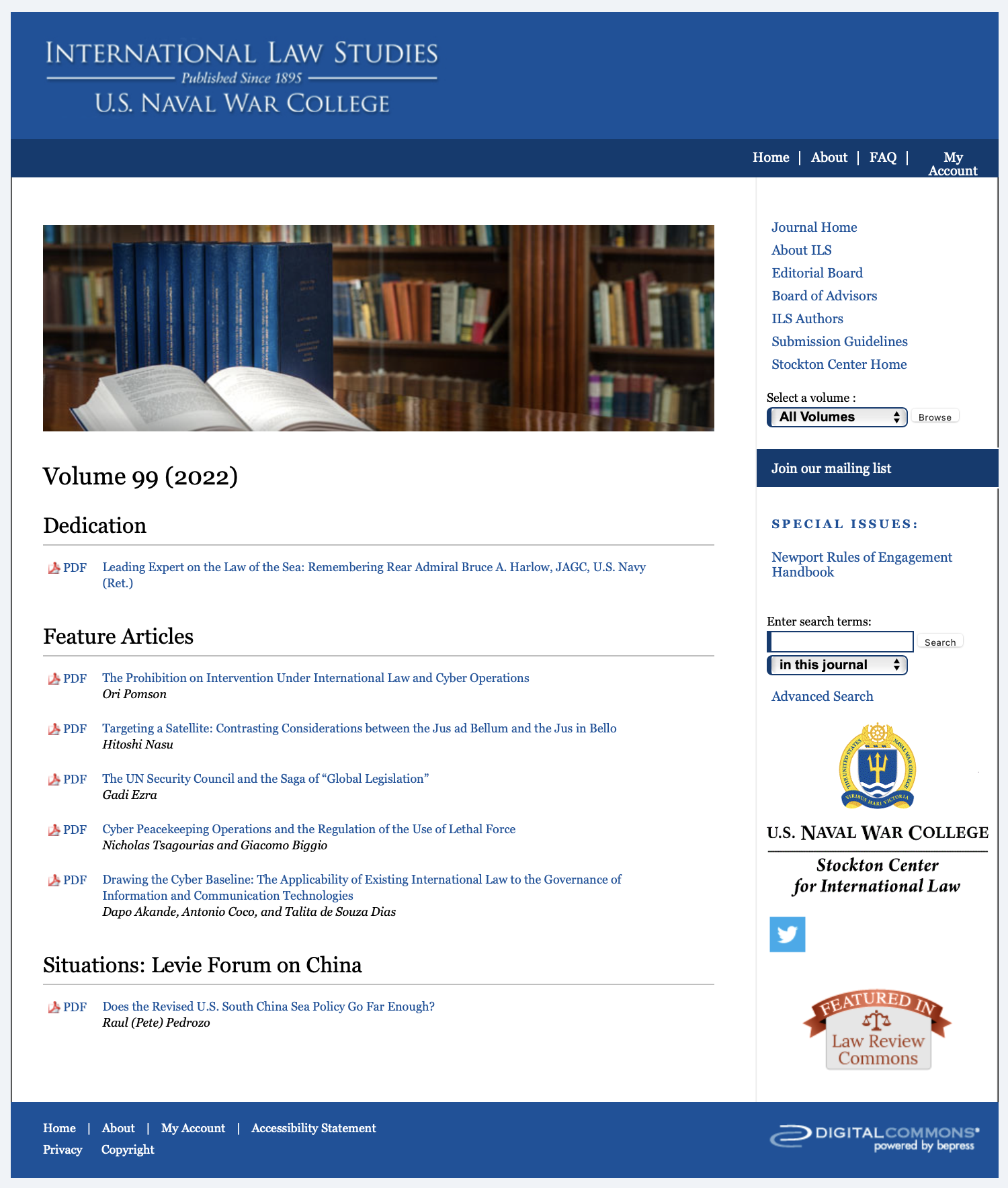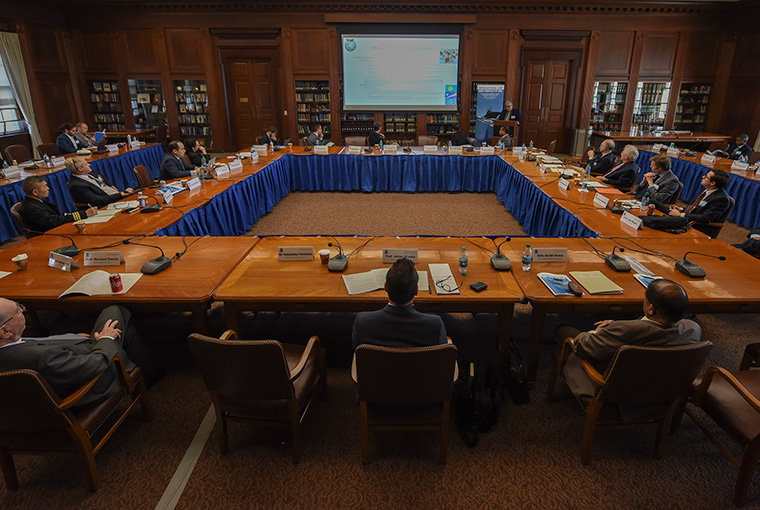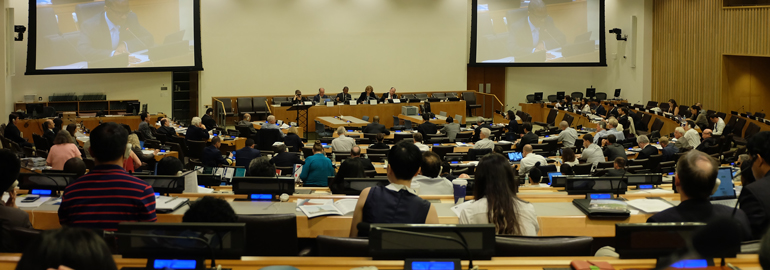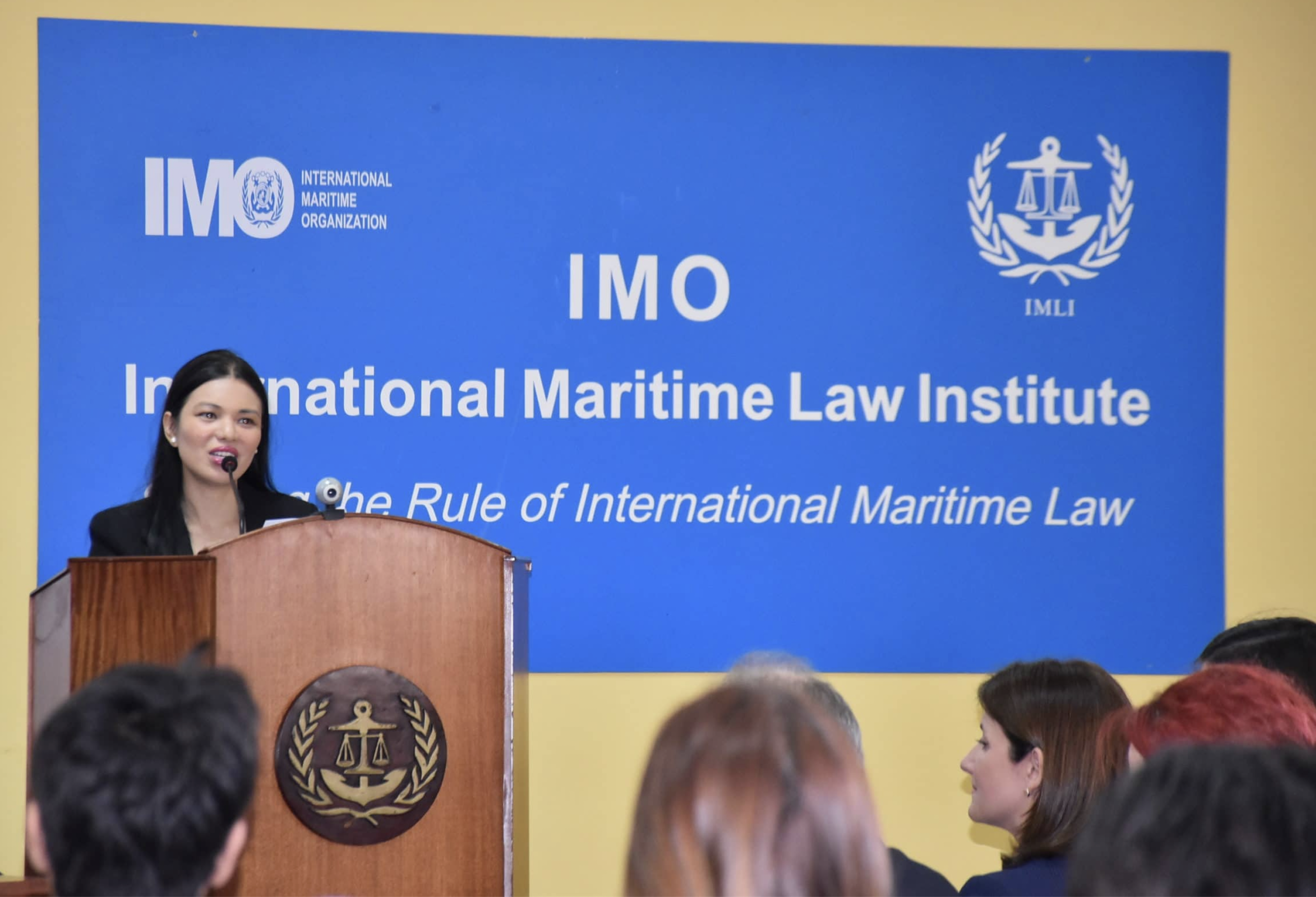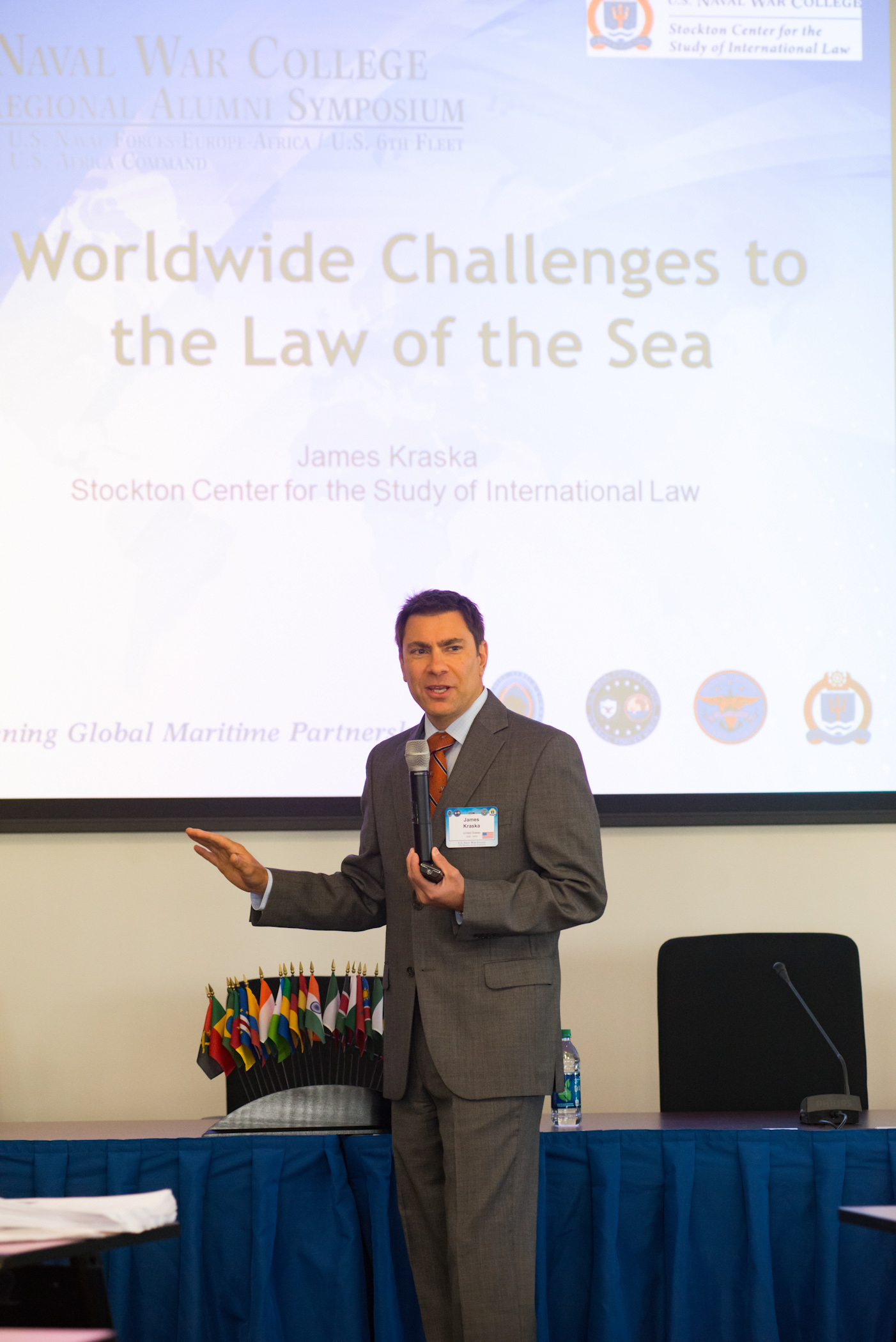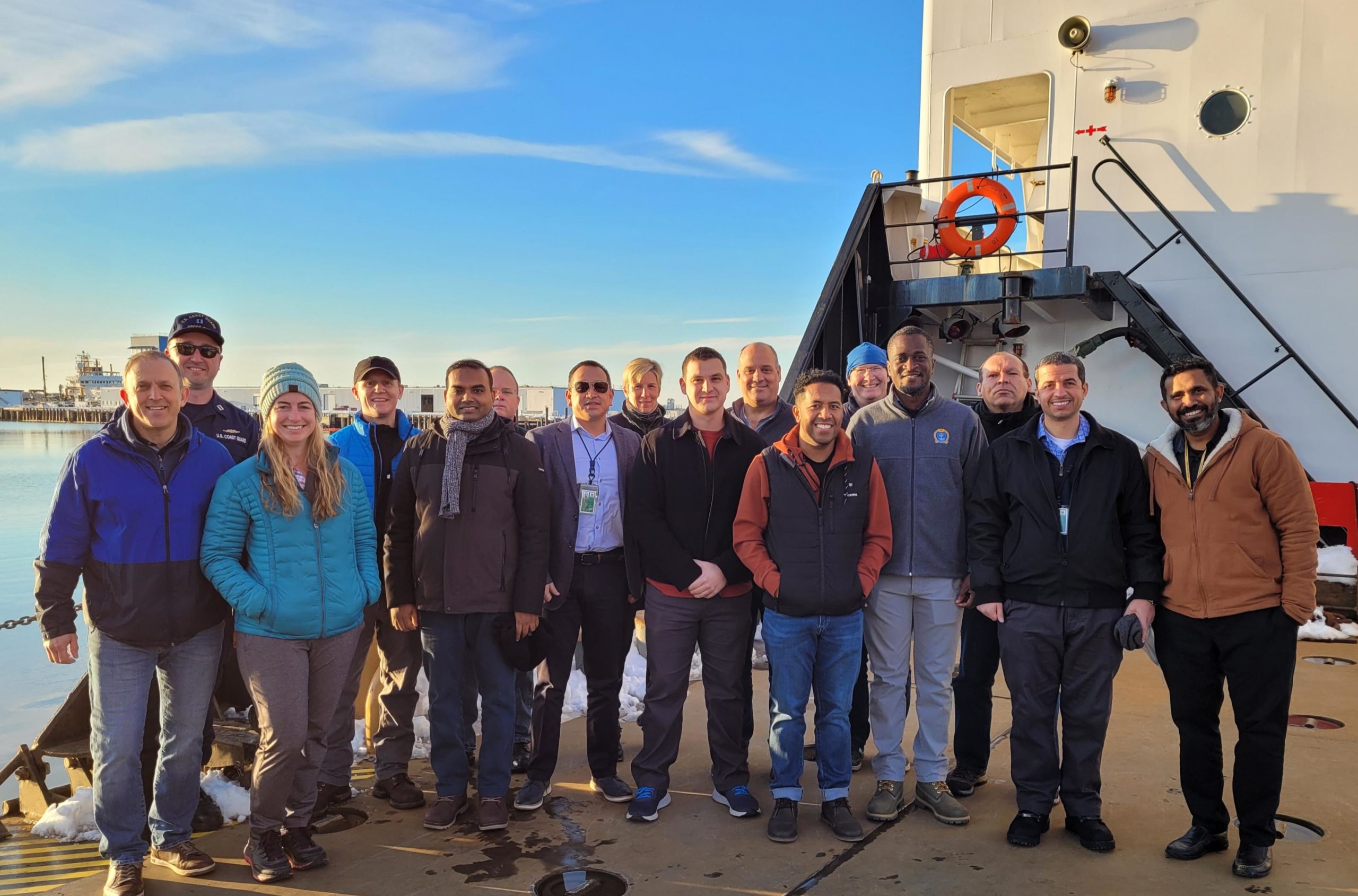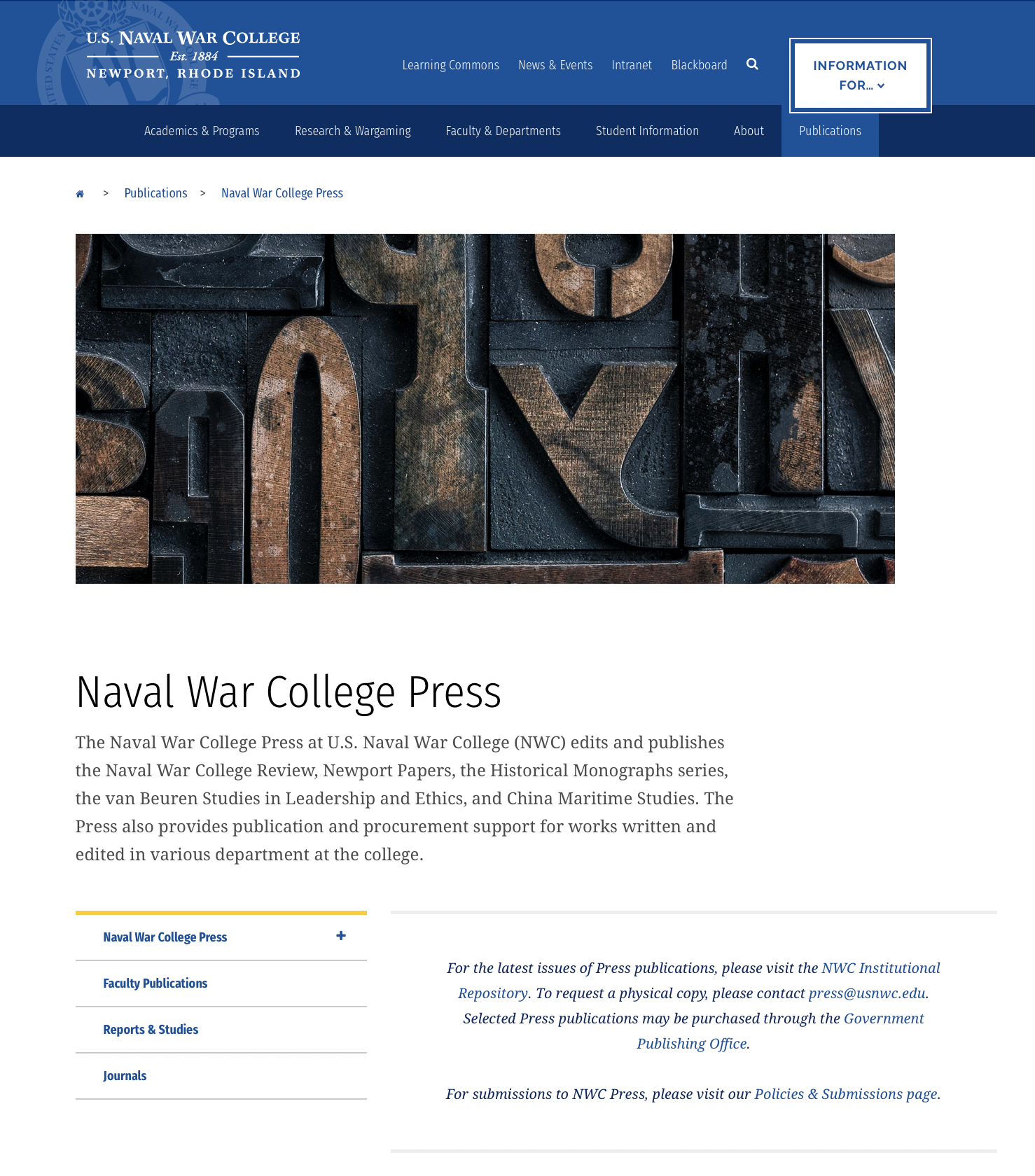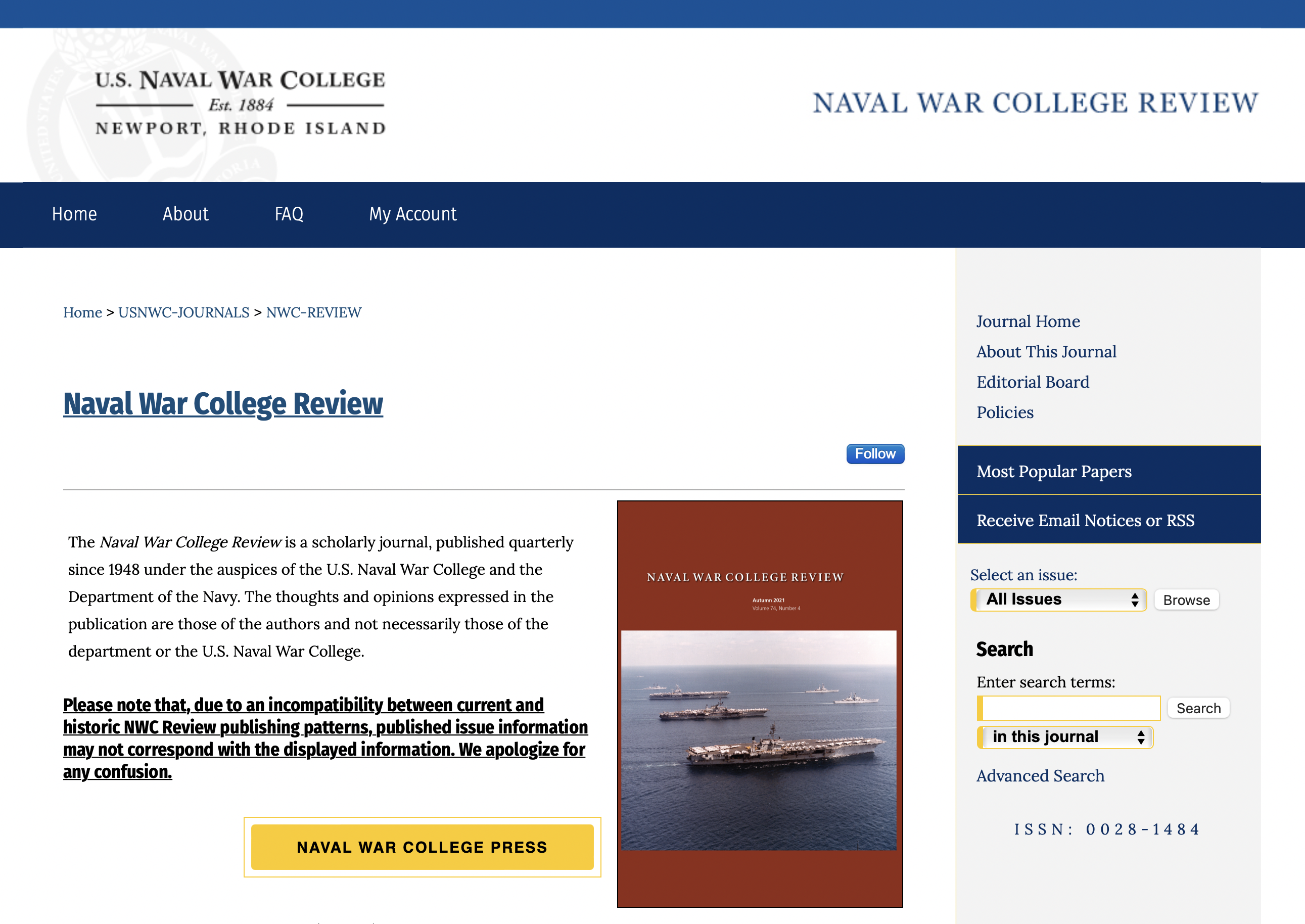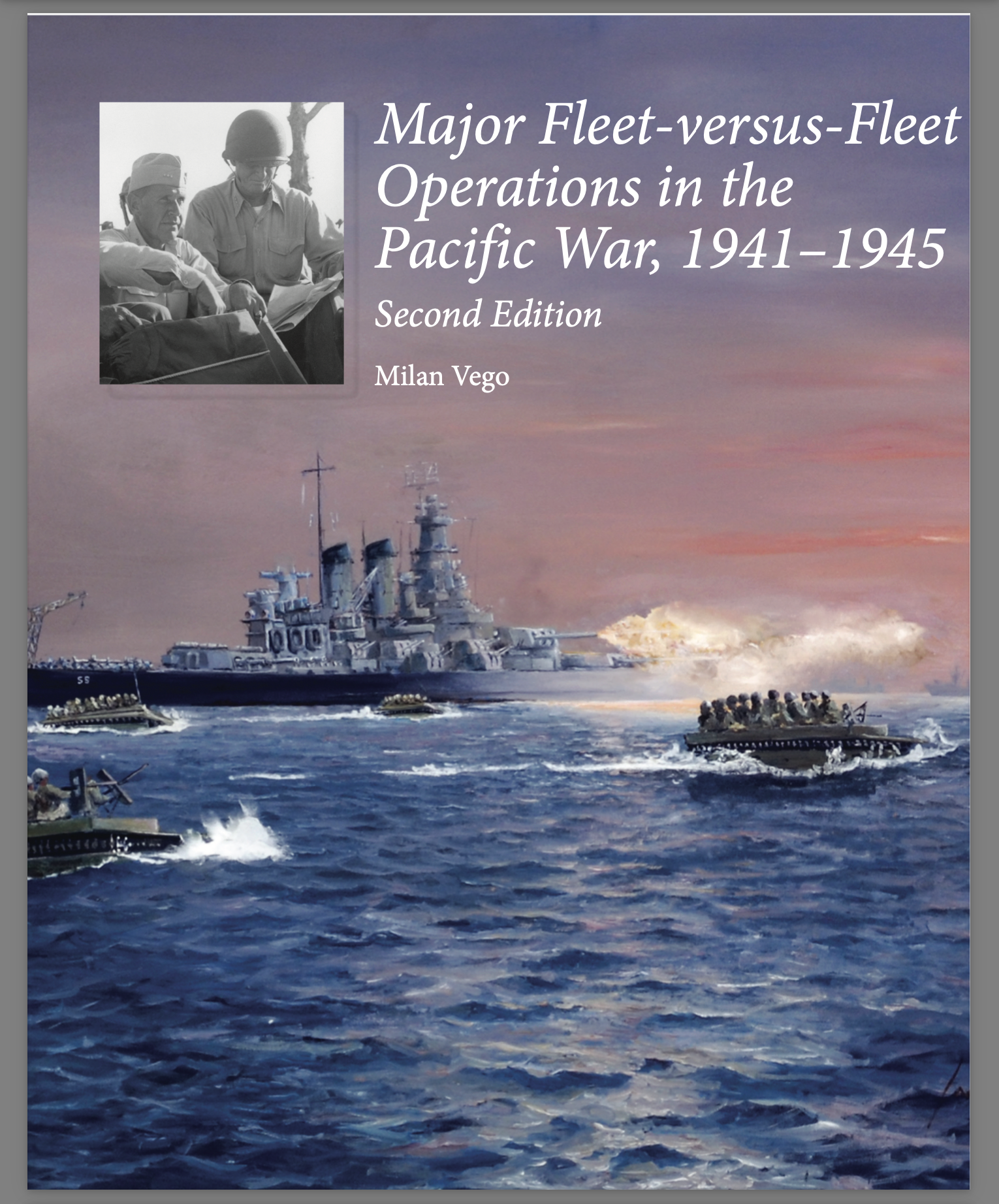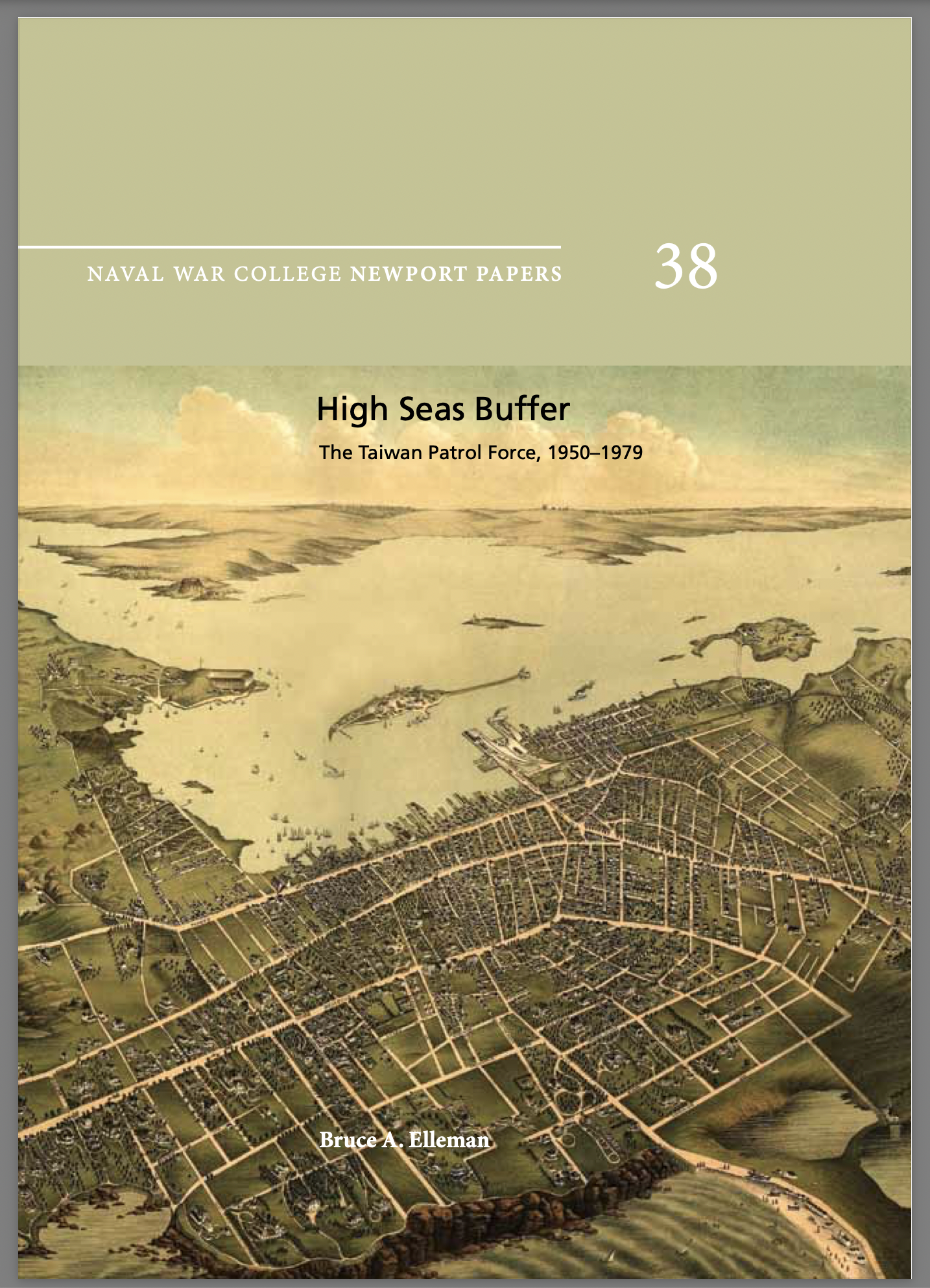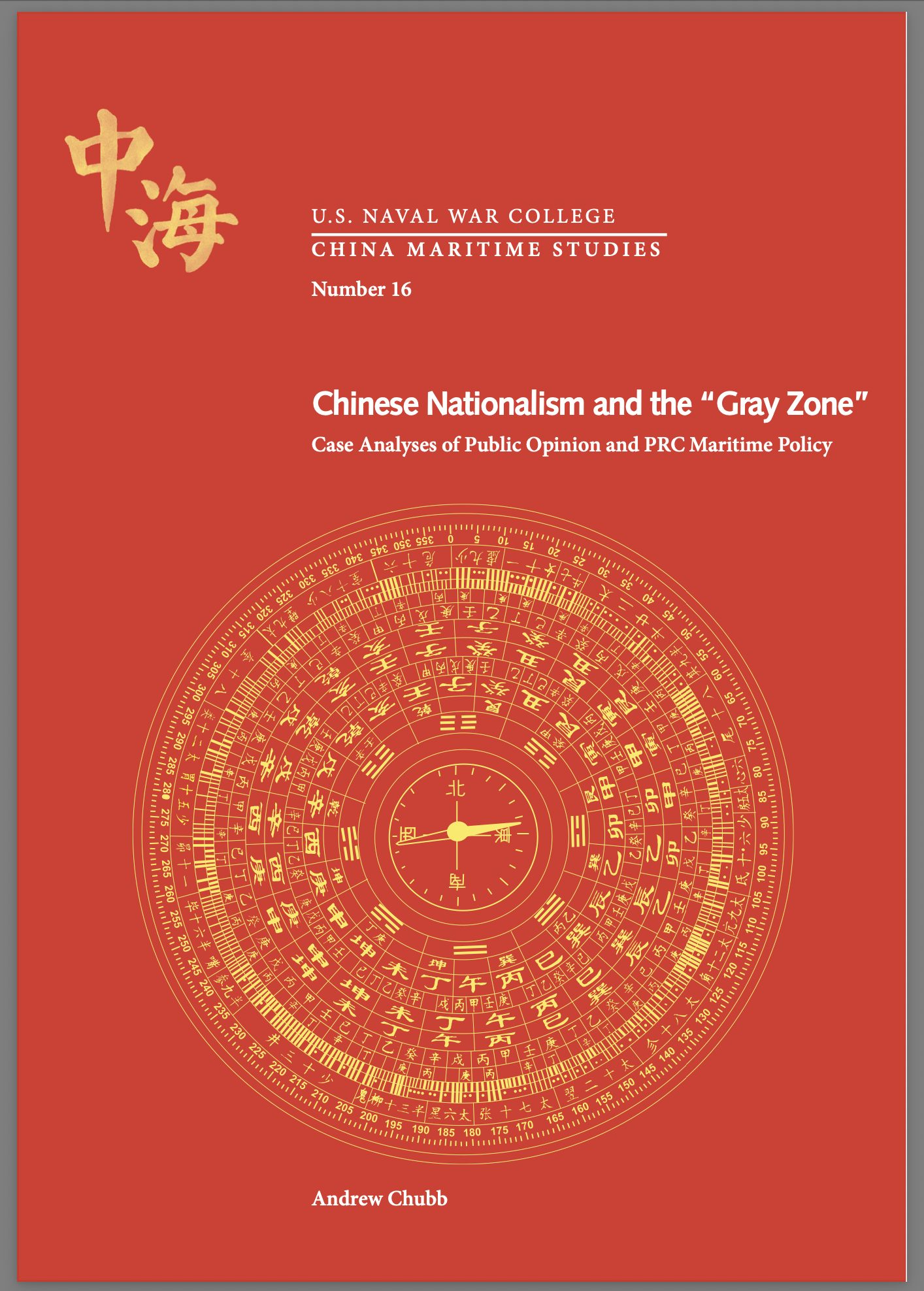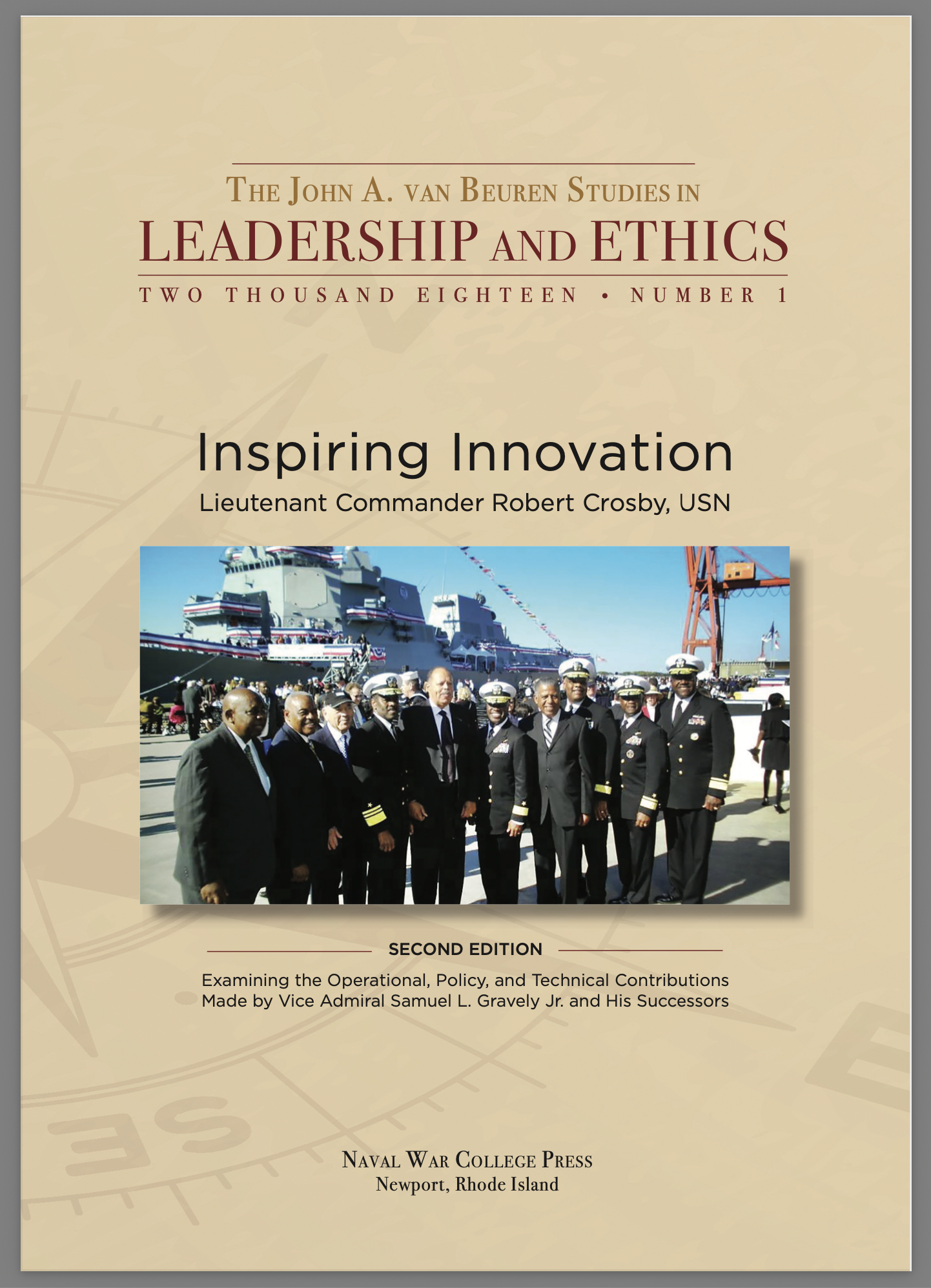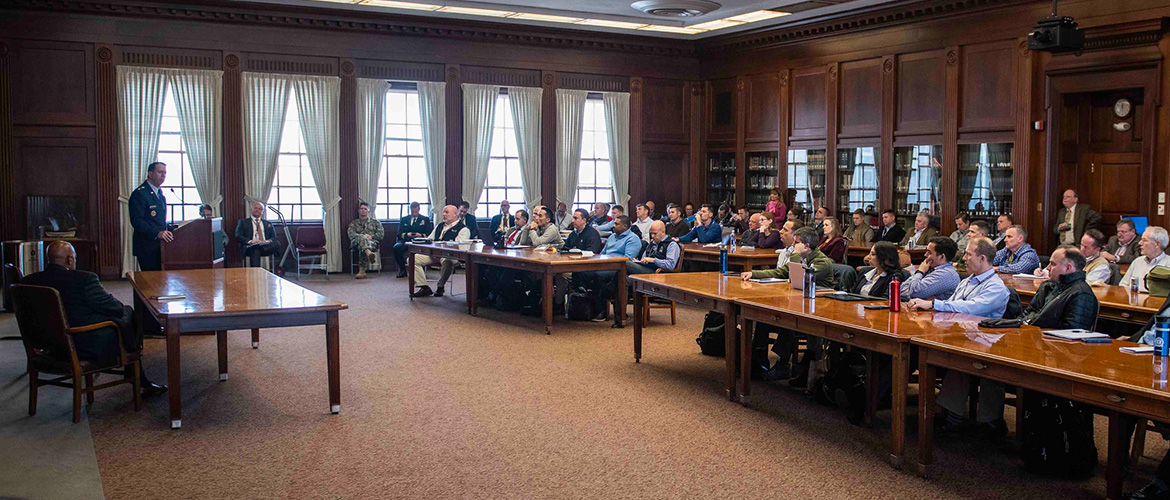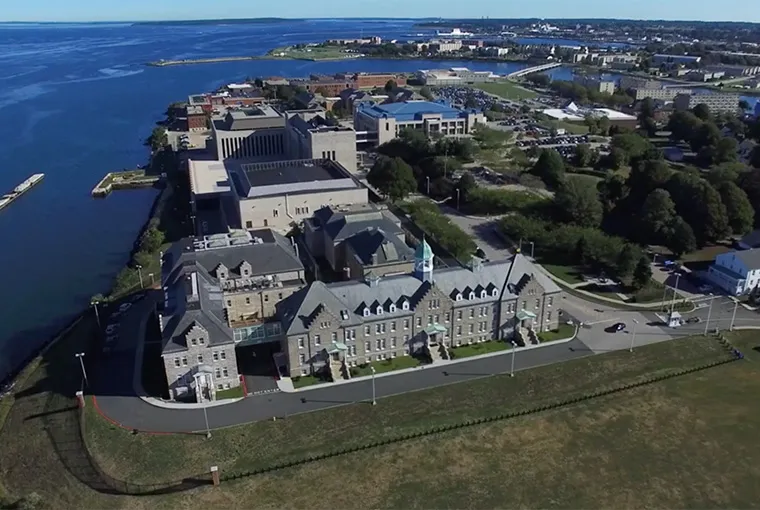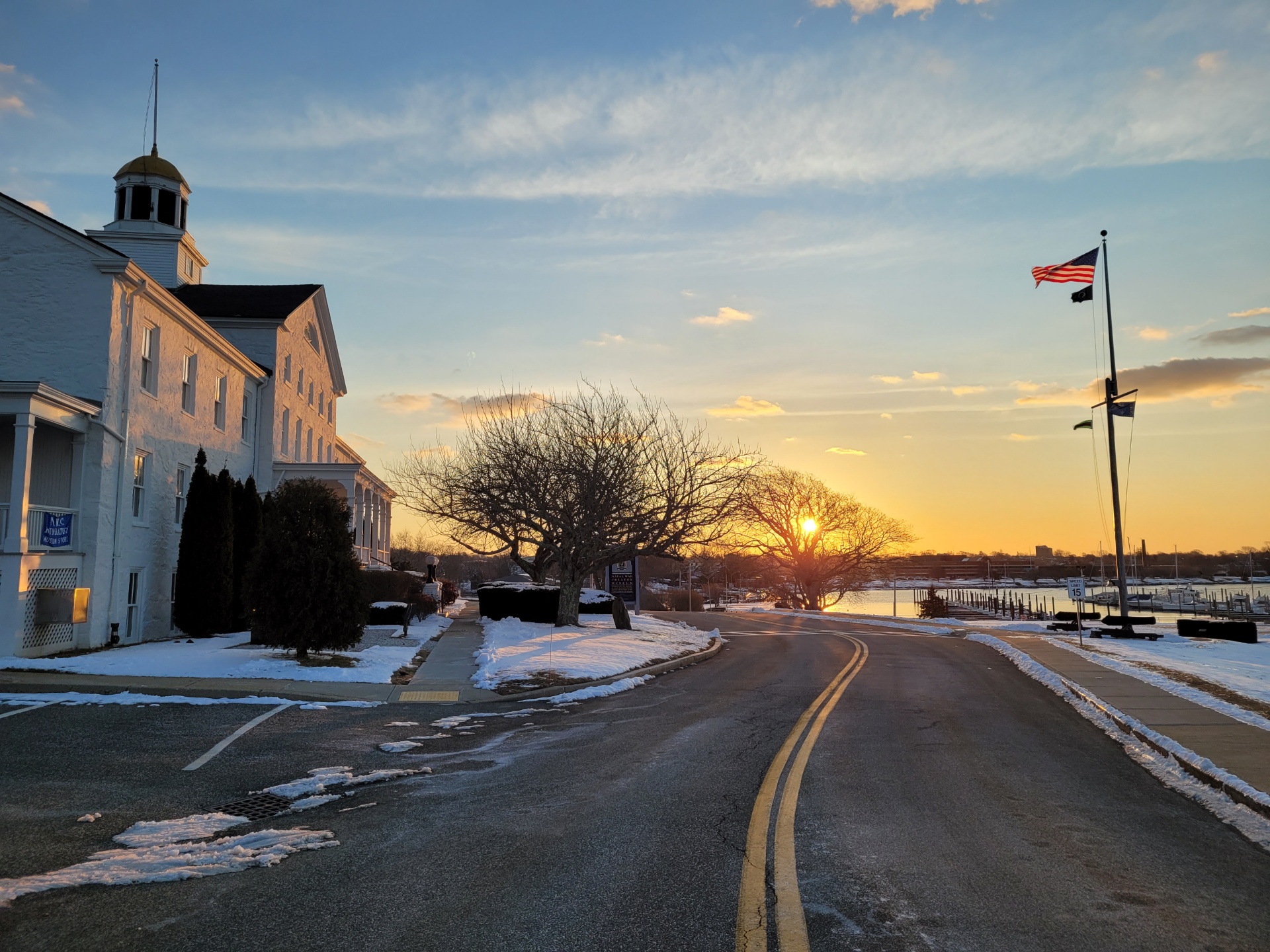The Center for Naval Warfare Studies (CNWS): An Introduction
Founded, in the words of Rear Admiral Stephen B. Luce, United States Navy, as “a place of original research,” one of the primary functions of the U.S. Naval War College (NWC) is to conduct research, analysis, and gaming to support the requirements of the Secretary of the Navy and others. The Center for Naval Warfare Studies (CNWS) contributes by serving as a home for fresh research, innovative thinking, and creative problem solving. CNWS is dedicated to assisting the Chief of Naval Operations in defining the future Navy and the Navy’s contribution to national strategy. This, in turn, supports NWC’s “Guiding Vision: We inform today’s decision-makers and educate tomorrow’s leaders.”
AN OPPORTUNITY TO LEAD
Today the Center seeks a new Dean to lead it through the remainder of a critical decade—click here to access complete information and apply via USA Jobs! And be sure to check out the additional information and photos available here!
Andrew S. Erickson, “The Center for Naval Warfare Studies (CNWS): An Introduction,” China Analysis from Original Sources 以第一手资料研究中国, 22 March 2022.
[To ensure a faithful rendering, this post draws extensively on authoritative NWC and NWC-related documents, to which it links throughout.]
ORGANIZATION
CNWS comprises several departments—the Strategic and Operational Research Department (SORD), the Wargaming Department, the Stockton Center for International Law, and the Naval War College Press—each with its own mission and specific study/research groups.
Within SORD, for example, are dedicated centers of expertise and research concerning both Beijing and Moscow’s seapower strategy and policies: the China Maritime Studies Institute (CMSI) and the Halsey Alfa Group, and the Russia Maritime Studies Institute (RMSI) and the Holloway Group. SORD is also home to such other impactful research centers as the Cyber and Innovation Policy Institute and the Institute for Future Warfare Studies.
MISSIONS
Together with the rest of SORD, CNWS, and stakeholders across the College, these organizations and associated faculty and students play a unique role in supporting the core Missions, Functions, and Tasks of the Naval War College, including its missions to:
(1) “Support Defining the Future Navy and Associated Roles and Missions”:
“The U.S. Naval War College conducts research, analysis and gaming to support the requirements of the Secretary of the Navy, the Chief of Naval Operations, the combatant commanders, the Navy component commanders, the Navy numbered fleet commanders, other Navy and Marine Corps commanders, the U.S. intelligence community and other departments and agencies of the U.S. Government. The desired effect is a program of focused, forward-thinking, timely and relevant research, analysis and gaming that anticipates future operational and strategic challenges; develops and assesses strategic and operational concepts to address those challenges; and assesses the risk associated with these concepts. The college will provide operational concepts, analytic products and briefings that provide knowledge to Navy and Department of Defense leadership to help shape and inform key decisions and contribute effectively to the public discourse on U.S. national security and defense policy.”
(2) “Support the Navy During an Era of Great Power Competition”:
“The U.S. Naval War College conducts operational level-of-war activities to support the ability of the Navy’s Joint and Combined Force Maritime Component Commanders and Navy Component Commanders to function effectively in an era of technological change and peer competition as operational commanders. This effort includes support for joint force commanders, Navy component commanders, Navy numbered fleet commanders and type commanders as they engage in planning, analysis, assessment and wargaming to anticipate and address emerging and current warfighting requirements. The desired effect is to improve the capability of Navy commanders to lead maritime joint and combined forces along with their staff members to plan, execute and assess force employment options to function effectively as an operational level maritime staff and maritime operations center.”
CNWS faculty play leading roles in NWC regional and functional Study Groups and other organizations.
While CNWS faculty and functions are distributed across the campus in Newport, the War Gaming Department—together with the Dean’s Office Suite and many other key components of CNWS—is located in McCarty Little Hall, a 110,000 square foot facility which opened in 1999 and is regularly updated with the latest technologies. The building is named after Captain William McCarty Little, the “father of American wargaming,” who was instrumental in the introduction and development of wargaming techniques at NWC dating back to 1887.
HISTORY
On 1 July 1981, almost a century after Rear Admiral Luce founded the Naval War College as “a place of original research on all questions relating to war and to statesmanship connected with war, or the prevention of war,” CNWS was established within the College through the initiative of Chief of Naval Operations Admiral Thomas Hayward, with the support of Secretary of the Navy John Lehman. The first director was the former Under Secretary of the Navy, Robert J. Murray.
Under Murray’s authority, CNWS consolidated several organizations previously dispersed: the Center for Advanced Research, the Center for War Gaming, and the Naval War College Press.
CNWS was from the start a nexus for broadly based, advanced research on the naval contribution to a national strategy. The Center’s work has ever since informed and stimulated the faculty and students in the classroom as well as helping to link the College to the fleet and policy makers in Washington. As Sailors and Scholars: The Centennial History of the Naval War College, documents officially (pp. 314–15),
“In Murray’s vision, at its core, the center was an intellectually dynamic group of officers and civilians with access to everyone, no matter what level, in the Navy and Marine Corps, anywhere in the world. Arguing real-life questions of strategy and tactics, testing real war plans, and developing new concepts of operation, the center in fact soon won widespread respect within the Navy. By concentrating on the uses of naval forces rather than entering the debate about specific budget programs, the center helped the college in the old task of building the foundations for better decisions. At the same time, the experience of broadly based advanced research, war gaming and highly experienced officers doing broad Navy thinking provided stimulus to both students and teaching faculty. The center was not the Navy’s war planning agency; it was the place where new ideas were examined and tested for possible incorporation into war plans. The war gaming center at the college was the heart of all Navy war gaming at the battlegroup level and above. As Murray explained, ‘it is the place where the Navy is asking itself, how do the forces fit together—first at the tactical level, then at the theater level, and then worldwide.’ As the result of these efforts, the Center for Naval Warfare Studies strengthened the link between the college and the fleet.”
As one of the initial Assistant Directors of CNWS, the naval thinker, writer, and Naval War College Press Editor Franklin Reinhardt Uhlig Jr., explained in Naval War College Review—which he then oversaw, and was charged with transforming it into a flagship publication—“Its business is ideas, in particular ideas about how to improve the contribution of naval forces to the defense of the United States and her allies.”
Working in close conjunction with the teaching departments, this revitalized research arm of NWC has over the ensuing four decades fulfilled inaugural President Luce’s vision, and subsequently that of Professor Uhlig and others, as a center of both scholarship and original research—an academic establishment which would serve as the home of theory and in-depth thinking for the naval profession in the United States.
The Center directly complements the curriculum at NWC by providing a place for researching important professional issues which, in turn, inform, and stimulate the faculty and students in the classroom. Moreover, from its very beginning, CNWS has linked the College to the fleet and policymakers in Washington by serving as a focal point, stimulus, and major source of strategic and campaign thought, by integrating strategic, campaign, and tactical concepts, by linking strategic concerns with technological developments, and finally, by testing and evaluating concepts through war gaming.
DEPARTMENTS
Here’s a closer look at the major departments within CNWS…
Strategic and Operational Research Department (SORD)
SORD produces innovative research and analysis for the U.S. Navy, the U.S. Department of Defense, and the broader security community. SORD produces forward-thinking and timely research, analysis, and gaming that anticipates future operational and strategic challenges. We develop and assess strategic and operational concepts to overcome challenges by providing analytical products that inform the U.S. Navy’s leadership and help shape key decisions. Our regional areas of focus include Eurasia, the Indo-Asia-Pacific, and the greater Middle East. Faculty members not only possess in-country experience and historical knowledge, but also facility in critical languages such as Russian, German, French, Chinese, and Japanese.
Research Centers:
SORD is home to several research centers and institutions that dive deeper into issues of interest to the U.S. Navy:
China Maritime Studies Institute (CMSI)
Established in 2006, CMSI studies China’s rapid commercial and maritime development. Research topics include shipbuilding, global commerce, law of the sea, and naval diplomacy.
Russia Maritime Studies Institute (RMSI)
Over the last decade, it’s become vital for the U.S. Navy and its partners to better understand the strategic and operational factors that shape Russia’s approach to maritime issues.
Cyber and Innovation Policy Institute (CIPI)
Protecting our nation is not just about traditional threats and battlefield weapons. Challenges lurk in cyberspace, including surveillance programs and wide-scale disruptions to government and corporations. CIPI advances and promotes research, education, and analysis in the evolving field of digital defense.
Institute for Future Warfare Studies (IFWS)
Launched in early 2017, IFWS focuses on the long-term needs of the U.S. Navy and national security. The center’s innovative, timely research and analysis will help leadership anticipate operational and strategic challenges. In response to this demand, NWC launched this institute in 2016.
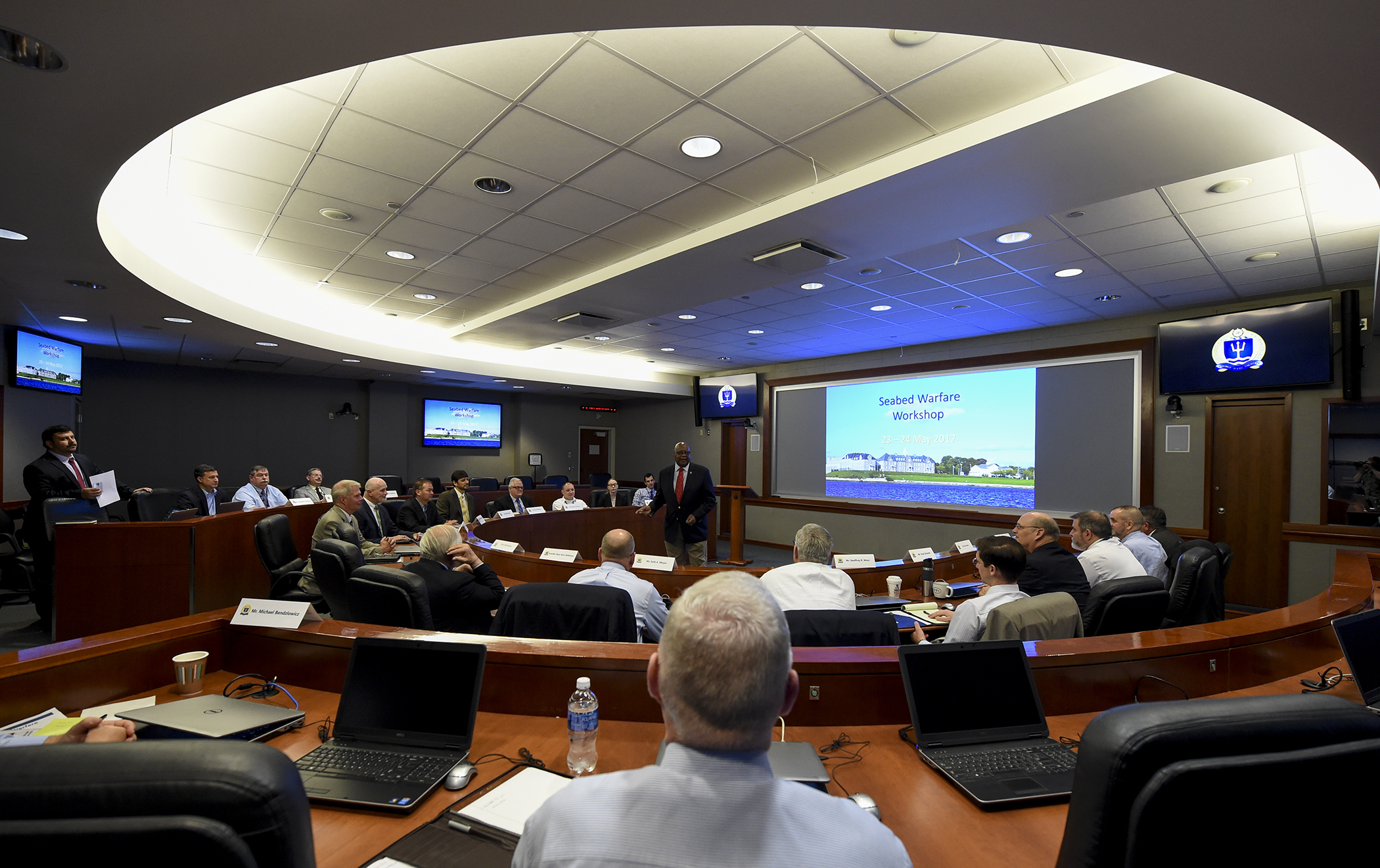
Advanced Research Programs:
Faculty-led special advanced research programs also call SORD home. These groups offer domestic students a chance to participate in gaming, research, and other real-world scenarios pertaining to strategy, planning, and operations.
The Cyber & Innovation Policy Institute Vice Admiral Samuel L. Gravely, Jr., Program is a Directed Research Project. This graduate-level program guides advanced student research on cyber operations and the information environment.
The Halsey Alfa Group is an Advanced Research Program (ARP) that examines the character of near-future operational-tactical warfighting at the high end of the conflict spectrum. Scenarios involve a technologically sophisticated military competition in East Asia. This group uses iterative, free play wargaming and operations research/systems analysis as their primary methodologies.
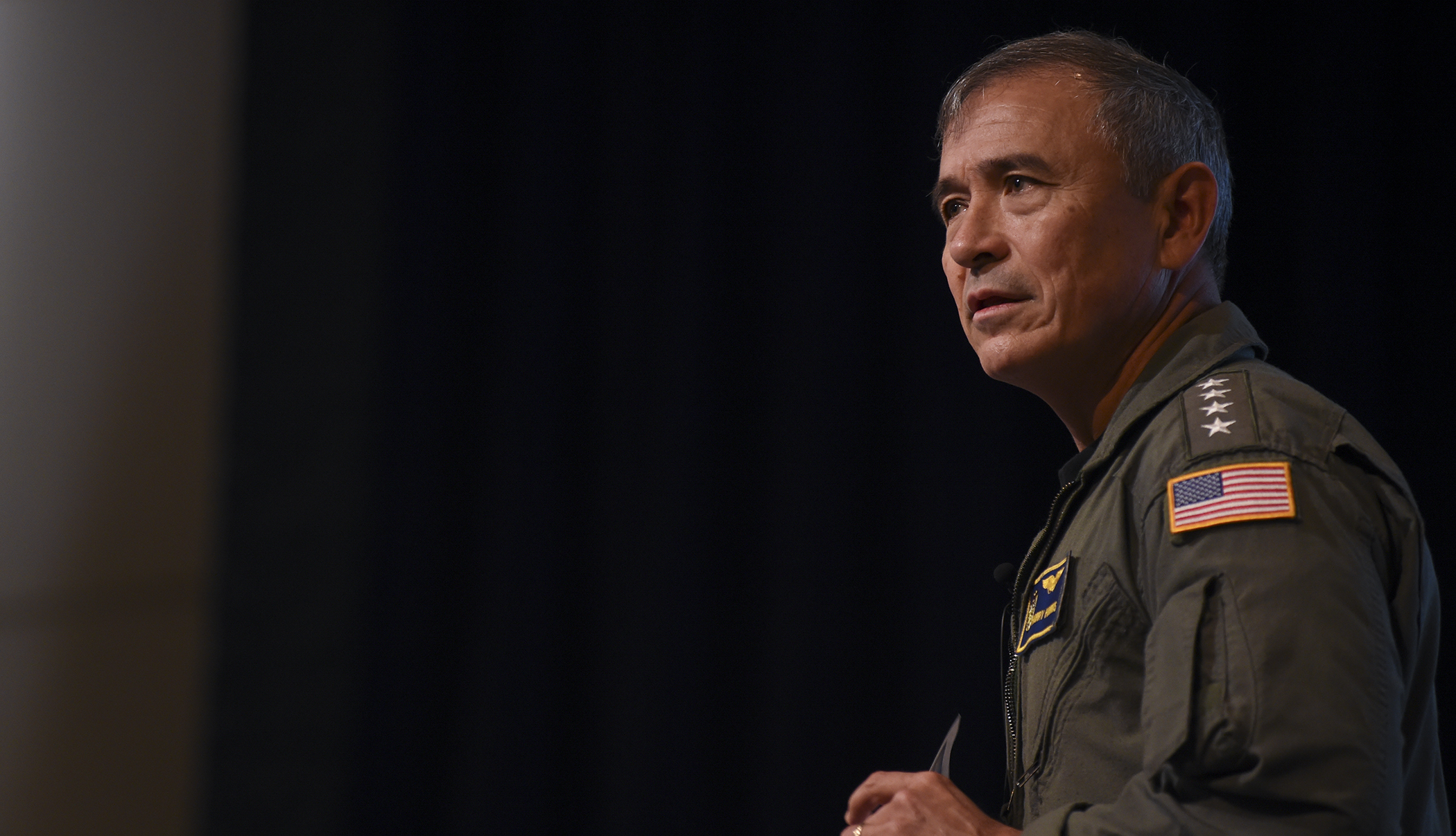
The Halsey Bravo Group is an Advanced Research Program (ARP) that examines potential military challenges within the Middle East. This faculty-student collaborative group uses iterative, ongoing wargaming and operational analysis as its primary methodology.
The Holloway Group is an Advanced Research Program (ARP) that conducts detailed studies of high-intensity conventional conflict, focusing on Russian maritime and multi-domain warfighting. It is a collaborative student-faculty research effort that utilizes military operations research, free-play wargaming, and open-source Russian-language research. It is housed within the Russia Maritime Studies Institute.
Strategic & Operational Research Department Faculty
SORD’s experienced and renowned faculty have years of earned expertise across a wide range of naval and educational topics. To learn more, please click here to access the online directory.
The War Gaming Department conducts high quality research, analysis, gaming, and education to support the Naval War College’s academic mission, prepare future maritime leaders, and help shape key decisions on the future of the Navy. The Department’s gaming professionals provide stakeholders with intellectually honest products utilizing rigorous research and analysis while employing gaming techniques which range from complex, multi-sided computer-assisted games to elementary, single-sided seminar games. Simulating complex war situations—from sea to space to cyber—builds analytical, strategic, and decision-making skills. Wargaming programming not only enriches the curriculum, but it also helps shape defense plans and policies for various commands and agencies.
Click here to view department brochure.
Simulations at sea—and beyond
Wargaming has been an integral part of Naval War College (NWC) since 1887. While the tools and technology used in simulations have evolved over the past century, the value of wargaming in maritime leadership development remains strong. Today the War Gaming Department remains the world’s premier gaming organization, conducting approximately 50 gaming events per year. They range in variety from complex, multi-sided computer-assisted games to simple, single-sided seminar games.
Wargaming supports our academic mission in many ways. Games foster an understanding of the decisions that military leaders and civilians make in maritime and joint warfare. Wargaming also opens discussion and debate of strategic and operational concepts. Finally, gaming provides insights and builds important risk assessment and analytical skills.
Gaming supports not only the academic curriculum with operational level student games, but also various internal College needs, and externally generated requests. These requests come from various branches of the Defense and Navy Departments, operational commands, and civilian agencies including the Office of the Secretary of Defense, the Department of State, and the Secretary of the Navy. Recently, War Gaming has resumed the Navy’s Title X Global Series and has shaped a variety of strategic and defense plans, policies, and strategies.
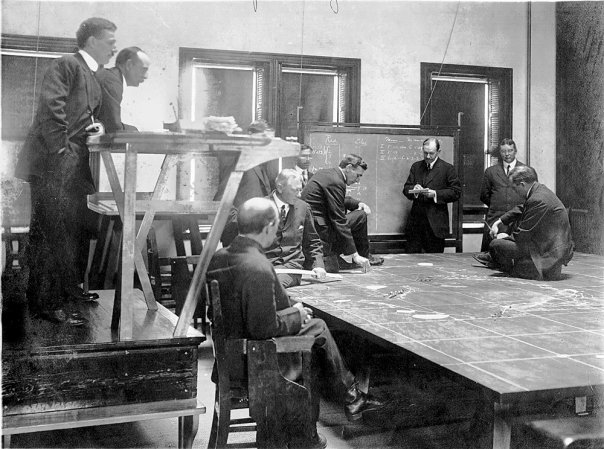
History of Wargaming at NWC & Captain William McCarty Little
“Now the great secret of its power lies in the existence of the enemy—a live, vicious enemy—in the next room waiting feverishly to take advantage of any of our mistakes, ever ready to puncture any visionary scheme, to haul us down to Earth.” — William McCarty Little, 1887
Our building, McCarty Little Hall, is named for Lt. William McCarty Little (1846-1915), who was instrumental in developing Naval War College’s wargaming techniques. In 1884, Little left active service after losing sight in one eye and began volunteering in the library of a new war college. In 1886, he introduced wargaming and soon became the U.S. Navy’s first expert in the field. One of his earliest activities including working alongside NWC’s second president, Captain Alfred Thayer Mahan, to develop a system of graphical representations behind historic naval battles.
In 1903, to honor Little’s contributions to NWC, Congress passed a special act that promoted him to captain and permanently assigned him to the college faculty. He served on the faculty and continued to develop wargaming for 30 years, retiring in 1915.
Wargaming Facilities
Inside our 111,000-square-foot wargaming facility, you’ll find a 180-seat auditorium, a television studio, 20+ reconfigurable gaming cells, and classroom and conference space.
Our gaming cells can host up to 400 computer stations—and access to classified and secure networks—and all are equipped with state-of-the-art video technology and the ability to broadcast throughout the facility and around the world. The largest of our gaming cells is the Joint Command Center, which can hold up to 100 computers.
The state-of-the-art information technology suite can be configured to support the full range of models and simulations, video-teleconferencing, group collaboration systems, and distributed wide area gaming over both unclassified and secure networks.
The auditorium is equipped with high-definition cameras and video-conferencing capabilities—and its large floor can double as an additional gaming cell or hold a 25-by-40-foot map to conduct a rehearsal of concept drill.
In addition to our on-campus facilities, our wargaming professionals also travel off-site and abroad to conduct tabletop exercises or give seminars.
Wargaming Topics, Collaborations, and Partnerships
Wargaming allows students to gain practical experience and a better understanding of the dynamics of warfighting, but simulations are also designed to prepare military leaders for national disasters and humanitarian relief.
Wargaming Topics
Wargaming covers a wide range of issues, including:
- Space
- Cyber
- Political-military relationships
- Sea control
- Nuclear deterrence
- Humanitarian assistance
- Disaster relief
- Homeland security/defense
Collaboration and Partnerships:
Gaming not only helps our students grow as leaders, but it supports internal research needs and external requests from other commands and civilian agencies. We work individually with requesting sponsors to develop gaming programs.
Partners and games have included:
- Chief of Naval Operation (Global Title X War Game Series)
- Office of the Secretary of Defense (Proliferation Security Initiative Game)
- OPNAV (Maritime Domain Awareness Operational Game)
- U.S. STRATCOM (Strategic Deterrence and Escalation Game)
Wargaming Faculty
The Department of Wargaming’s core faculty comprises approximately 40 military and civilian gaming professionals, who are supported by a staff of highly skilled technicians and enlisted Navy personnel. With their expertise comes a commitment to academic rigor and innovative research.
Stockton Center for International Law
The Stockton Center for International Law (SCIL) is an internationally recognized research institute for the study of international law and military operations that produces original research and analysis for national decision-makers, senior military leaders, scholars, and legal practitioners throughout the world in order to better grasp the role of international law in naval, Joint and Combined operations. The results of this analysis shapes legal interpretations affecting U.S. and partner nation forces throughout the world.
International Law Studies Journal
International Law Studies (ILS) is the journal for international law published by the U.S. Naval War College. It was first published in 1895 and is the oldest international law periodical in the United States. Each year, the journal publishes faculty peer-reviewed articles and analysis from the world’s leading experts and practitioners in the law of the sea, the law of armed conflict and international humanitarian law, the law of naval operations, and the international law of conflict in the airspace, outer space, and cyberspace.
Support, Domestically and Abroad
SCIL provides international law research, analysis, and teaching to support the development of the Navy’s future strategy, the education and training of Navy leadership, and the conduct of fleet, joint, and combined operations. The program also provides legal support to war games and advice to the Fleet and other Department of Defense entities on a variety of international and operational law issues. SCIL serves as the Primary Review Authority for the Commander’s Handbook on the Law of Naval Operations, and have participated in the Tallinn Manual, the San Remo Manual, the Woomera Manual, the Harvard Air and Missile Warfare Manual, and other influential publications. Annually, the Stockton Center hosts legal research workshops on emergent issues drawing many of the world’s leading international law experts, including the annual Alexander C. Cushing International Law Conference.
Conference on Oceans Law & Policy
Through the annual Conference on Oceans Law & Policy (established and formerly administered by the Center for Oceans Law & Policy, University of Virginia School of Law) the Stockton Center for International Law promotes interdisciplinary interaction with ocean-related legal and public policy issues at all levels, addressing international, national, regional, and state concerns.
Stockton Center for International Law Faculty
The Stockton Center has civilian and military professors of international law that teach courses on the law of armed conflict, the law of naval warfare and maritime security law, and the law of airspace, outer space and cyberspace operations.
Professor James Kraska is the Chair of the Stockton Center for International Law and the Charles H. Stockton Professor of International Maritime Law. The Secretary of the Navy established the Charles H. Stockton Chair of International Law on October 6, 1967 in honor of Rear Admiral Charles H. Stockton, president of the Naval War College from 1898–1900, a recognized authority on international law. Stockton was also president of George Washington University and he wrote the first code of the Law of Naval Warfare. From its inception, the Chair has attracted an exceptional array of international law scholars to the College, including such giants in the field as Manley O. Hudson (1951–53), Hans Kelsen (1953–54), Leo Gross (1954–55), Howard S. Levie (1971–72), Leslie C. Green (1996–97), Hays Parks (1984–85), Ruth Wedgwood (1998–99), Yoram Dinstein (1999–2000), Ivan Shearer (2000–01), Charles Garraway (2004–05), Wolff Heintschel von Heinegg (2003–04 and 2012–13), Michael N. Schmitt (2014–18).
Professor Raul “Pete” Pedrozo is the Howard S. Levie Professor of the Law of Armed Conflict. The Levie Chair is named for retired Col. Howard S. Levie, who served as a U.S. Army judge advocate during World War II and the Korean War. He reviewed Japanese war crimes tribunals and was the principle draftsman for the Korean War Armistice. After military service, Colonel Levie joined the faculty at Saint Louis University School of Law where he went on to become one of the world’s leading scholars on international law, publishing some twenty books on the law of armed conflict. Levie’s long association with the Center was acknowledged by the President of the Naval War College in 1994 with the creation of the Levie Chair.
The Stockton Center Emeriti Professors
Professor Michael N. Schmitt, D.Litt., J.D.
Michael Schmitt is professor emeritus at the U.S. Naval War College. He is presently Professor of International Law at the University of Reading and the G. Norman Lieber Distinguished Scholar at the U.S. Military Academy at West Point.
Professor Richard J. Grunawalt
Richard J. “Jack” Grunawalt is Professor Emeritus of International Law. Following a distinguished career as a Navy judge advocate, retired Capt. Grunawalt came to the Naval War College as the Charles H. Stockton Professor of International Law and held that Chair until becoming the first Director of the Oceans Law and Policy Department, the predecessor of the Stockton Center for International Law. Under his leadership of its international law program, during his tenure the Naval War College regained its historic stature as the world’s preeminent military institution for the study and articulation of the rules of law governing the world’s oceans, both in time of peace and in time of war.
Stockton Center Visiting Research Scholar Program
The Stockton Center invites eminent international law scholars, as well as exceptional younger scholars, to share their knowledge and varied perspectives with the U.S. Naval War College through its Visiting Research Scholar Program.
Visiting Fellows:
- Visheh Bhatia, National Academy of Legal Studies and Research University
- Laurie Blank, Emory University School of Law
- Peter Bowers, Royal Australian Navy Reserve
- Douglas Burnett, John Hopkins University Applied Physics Laboratory
- Camilla Cooper, Norwegian Defence Command and Staff College
- John Dehn, Loyola University School of Law
- Gloria Gaggioli, University of Geneva
- Koichi Ishii, Japanese Maritime Self-Defence Academy
- Suk Kyoon Kim, Korea Coast Guard
- Keiko Kono, National Institute of Defense Studies (Japan)
- Masahiro Kurosaki, National Defense Academy of Japan Ministry of Defence
- Tim McCormack, University of Melbourne (Stockton Distinguished Visiting Scholar)
- Young-Kil Park, Korea Maritime Institute
- Sasha Radin, University of Melbourne
- Vishaka Ramesh, National Academy of Legal Studies and Research University
- Yusuke Saito, Japanese Maritime Self-Defence Academy
- Nicholas Tsagourias, University of Sheffield
- Bart van den Bosch, Royal Netherlands Army
- René Värk, University of Tartu (Estonia)
The Naval War College Press at U.S. Naval War College (NWC) edits and publishes the Naval War College Review, Newport Papers, the Historical Monographs series, the van Beuren Studies in Leadership and Ethics, and China Maritime Studies. The Press also provides publication and procurement support for works written and edited in various department at the college.
The Naval War College Review is a scholarly journal, published quarterly under the auspices of the Naval War College and the Department of the Navy, but exercising editorial independence; the thoughts and opinions expressed in the publication are those of the authors and not necessarily those of the department or the Naval War College. The Review has been published continuously since 1948. It serves as a forum for discussion of public policy matters of interest to the maritime services. The candid views of the authors are presented for the professional education of the readers. Articles are drawn from a wide variety of sources to inform, stimulate, and challenge readers, and to serve as a catalyst for new ideas.
The historical monographs in this series are book-length studies of the history of naval warfare, edited historical documents, conference proceedings, and biographies based wholly or in part on source materials in the Historical Collection of the Naval War College. They are managed by the Maritime History Department in collaboration with the Naval War College Press.
Newport Papers are extended research projects that the Director, the Dean of Naval Warfare Studies, and the President of the Naval War College consider to be of particular interest to policy makers, scholars, and analysts. These book-length monographs cover a variety of subjects, but ideally relate to contemporary operational or strategic concerns in the realm of maritime security. Printed copies of Newport Papers are distributed to a list of approximately 300 senior commanders and staff members.
CMSI China Maritime Studies (“Red Books”)
The China Maritime Studies are extended research projects that the Editor, the Director of the China Maritime Studies Institute (CMSI), the Dean of the Center for Naval Warfare Studies, and the President of the Naval Warfare College consider to be of particular interest to policy makers, scholars, and analysts. The Naval War College Press prepares and publishes the studies for CMSI.
The van Beuren Leadership and Ethics Series
The van Beuren Studies in Leadership and Ethics series was established to advance scholarship and publish thought-provoking works of analysis in the fields of leadership and ethics, with special attention to their application to the military; to further Chief of Naval Operations initiatives in leadership and ethics; to help educate Naval War College students; and to help inform the joint force. The Naval War College and the Naval War College Press thank the Naval War College Foundation and the Alletta Morris McBean Charitable Trust for their generous support.

